Unit 4 Pygmalion 单元导学课件(166张)
文档属性
| 名称 | Unit 4 Pygmalion 单元导学课件(166张) | 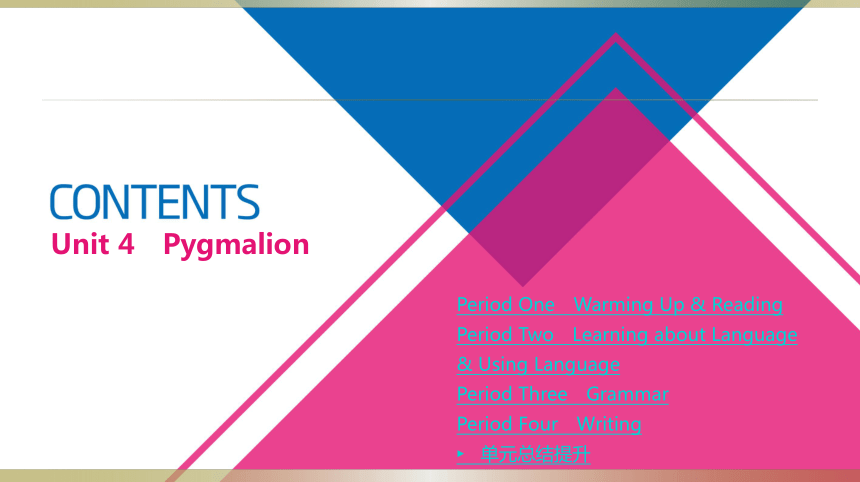 | |
| 格式 | zip | ||
| 文件大小 | 2.1MB | ||
| 资源类型 | 教案 | ||
| 版本资源 | 人教版(新课程标准) | ||
| 科目 | 英语 | ||
| 更新时间 | 2019-04-07 10:53:43 | ||
图片预览

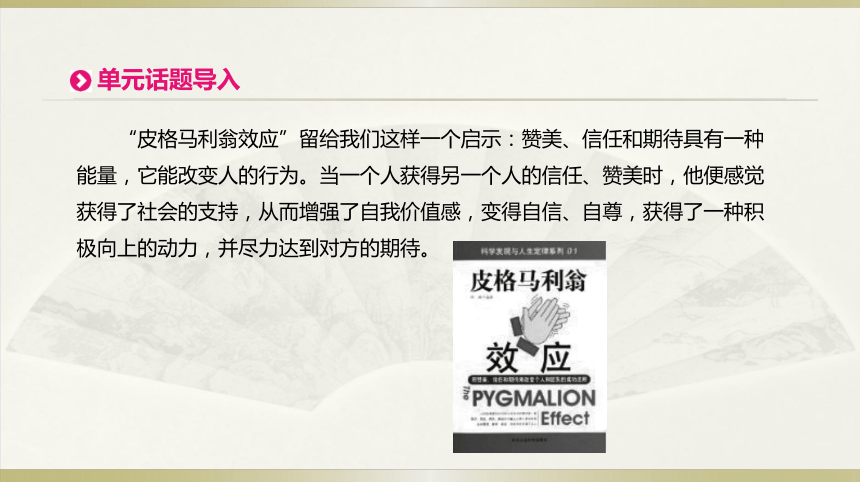
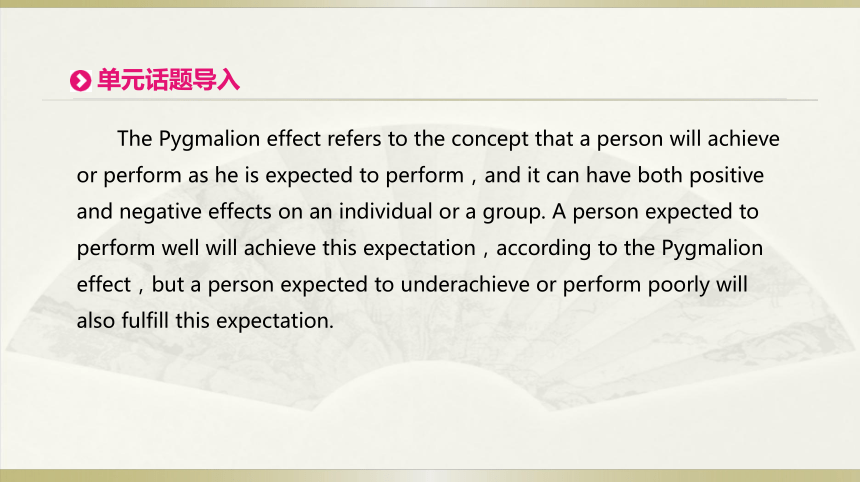
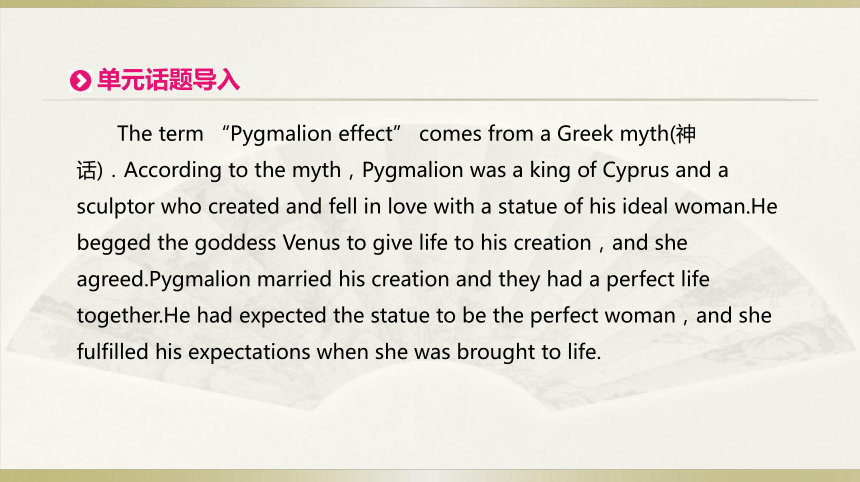
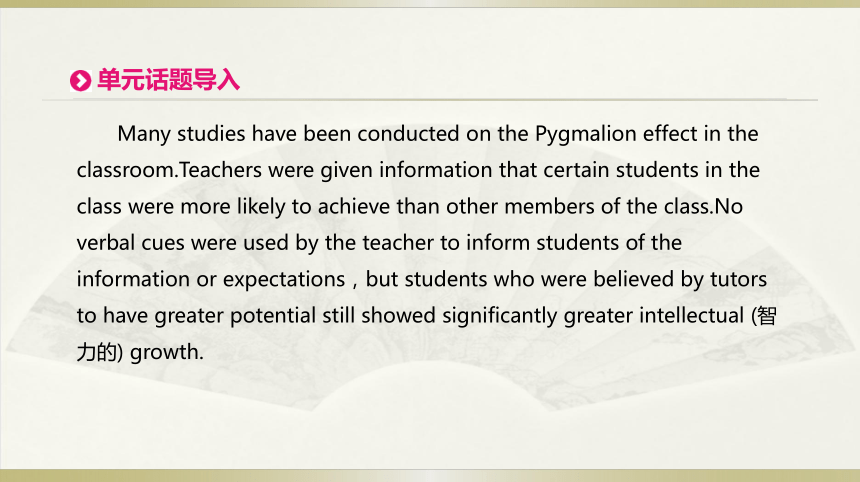
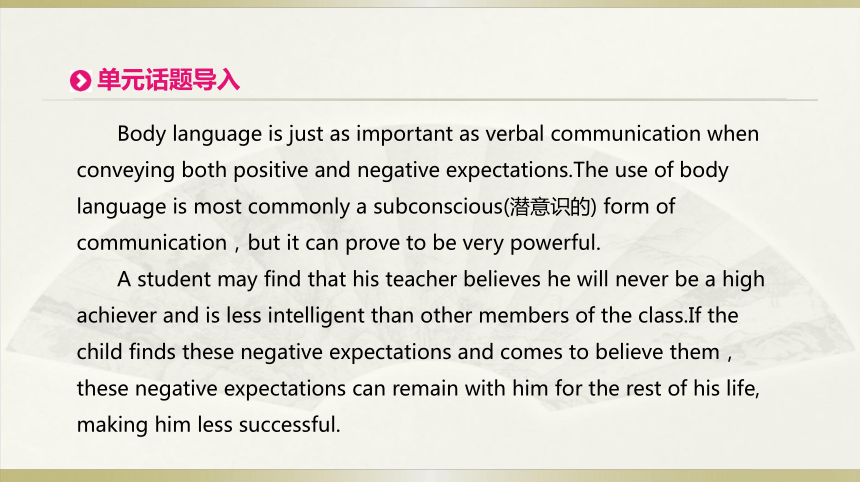
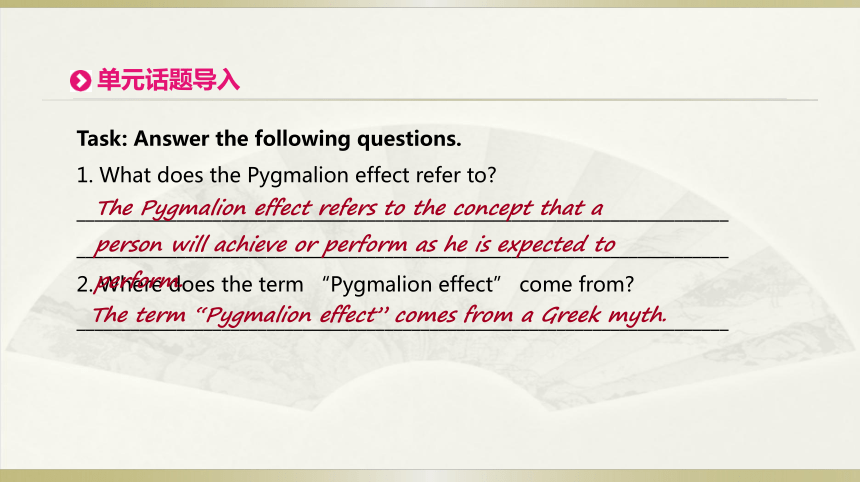
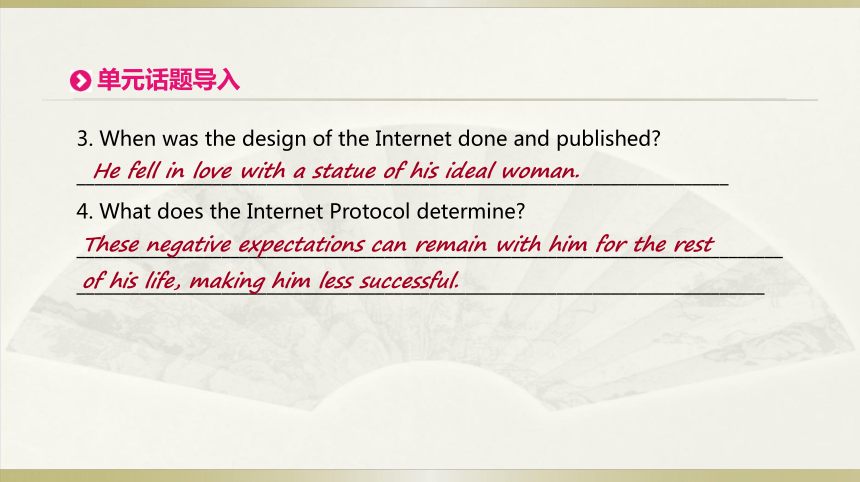
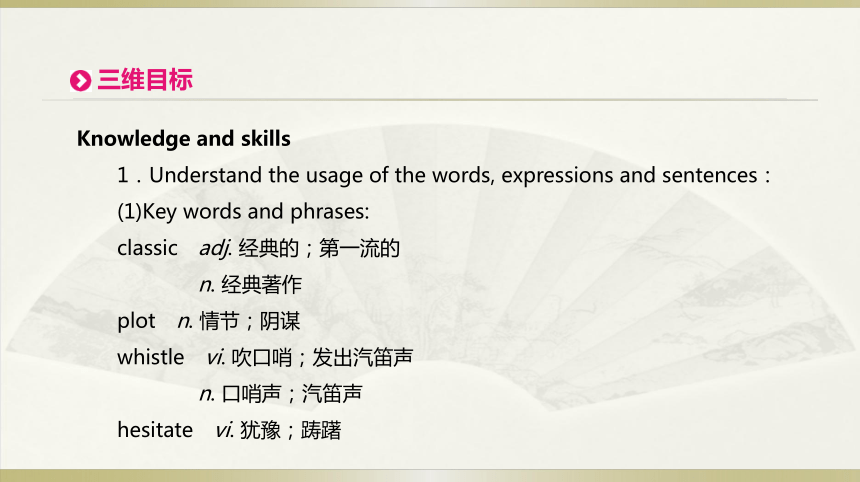
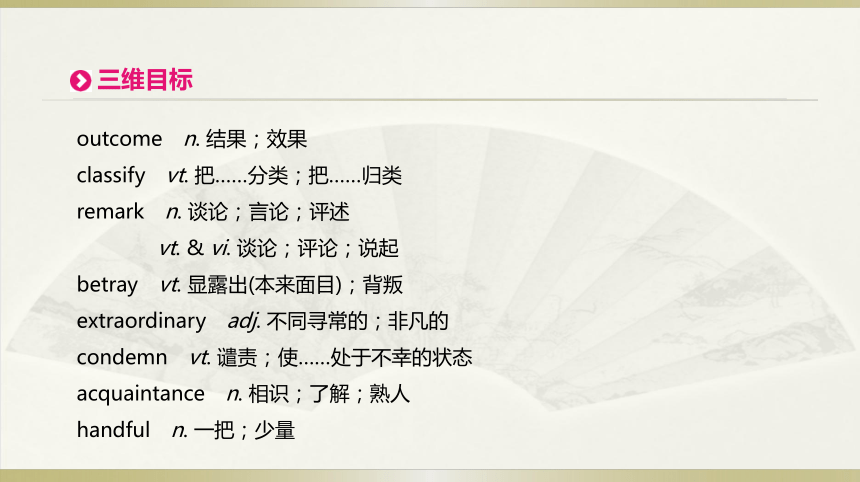
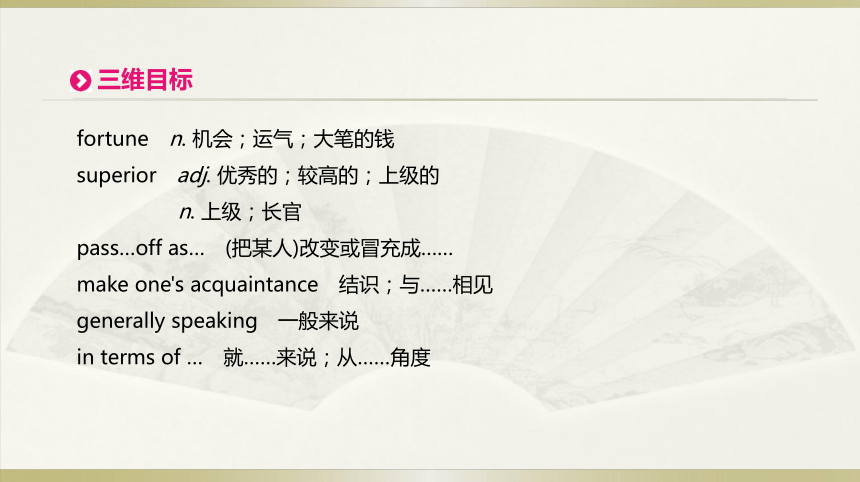
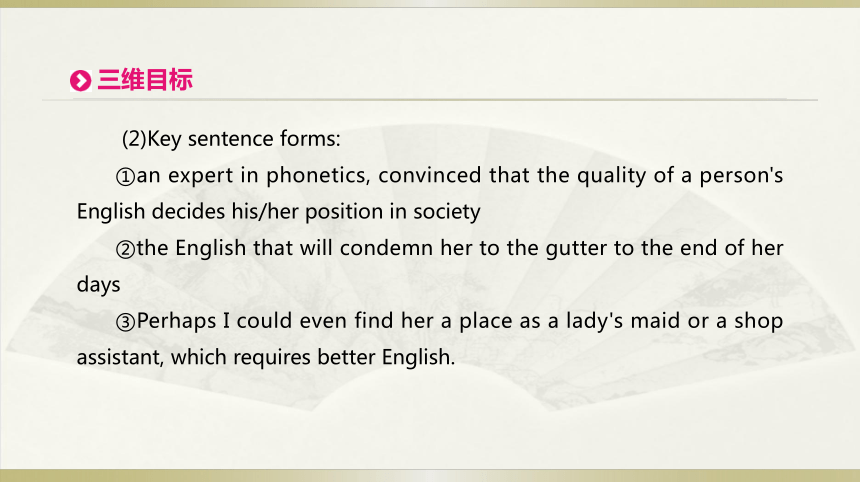
文档简介
Unit 4 Pygmalion
Period One Warming Up & Reading
Period Two Learning about Language & Using Language
Period Three Grammar
Period Four Writing
? 单元总结提升
“皮格马利翁效应”留给我们这样一个启示:赞美、信任和期待具有一种能量,它能改变人的行为。当一个人获得另一个人的信任、赞美时,他便感觉获得了社会的支持,从而增强了自我价值感,变得自信、自尊,获得了一种积极向上的动力,并尽力达到对方的期待。
单元话题导入
The Pygmalion effect refers to the concept that a person will achieve or perform as he is expected to perform,and it can have both positive and negative effects on an individual or a group. A person expected to perform well will achieve this expectation,according to the Pygmalion effect,but a person expected to underachieve or perform poorly will also fulfill this expectation.
单元话题导入
The term “Pygmalion effect” comes from a Greek myth(神话).According to the myth,Pygmalion was a king of Cyprus and a sculptor who created and fell in love with a statue of his ideal woman.He begged the goddess Venus to give life to his creation,and she agreed.Pygmalion married his creation and they had a perfect life together.He had expected the statue to be the perfect woman,and she fulfilled his expectations when she was brought to life.
单元话题导入
Many studies have been conducted on the Pygmalion effect in the classroom.Teachers were given information that certain students in the class were more likely to achieve than other members of the class.No verbal cues were used by the teacher to inform students of the information or expectations,but students who were believed by tutors to have greater potential still showed significantly greater intellectual (智力的) growth.
单元话题导入
Body language is just as important as verbal communication when conveying both positive and negative expectations.The use of body language is most commonly a subconscious(潜意识的) form of communication,but it can prove to be very powerful.
A student may find that his teacher believes he will never be a high achiever and is less intelligent than other members of the class.If the child finds these negative expectations and comes to believe them,these negative expectations can remain with him for the rest of his life, making him less successful.
单元话题导入
Task: Answer the following questions.
1. What does the Pygmalion effect refer to?
________________________________________________________________________
________________________________________________________________________
2. Where does the term “Pygmalion effect” come from?
________________________________________________________________________
单元话题导入
The Pygmalion effect refers to the concept that a person will achieve or perform as he is expected to perform.
The term “Pygmalion effect” comes from a Greek myth.
3. When was the design of the Internet done and published?
________________________________________________________________________
4. What does the Internet Protocol determine?
__________________________________________________________________________________________________________________________________________________________
单元话题导入
He fell in love with a statue of his ideal woman.
These negative expectations can remain with him for the rest of his life, making him less successful.
Knowledge and skills
1.Understand the usage of the words, expressions and sentences:
(1)Key words and phrases:
classic adj. 经典的;第一流的
n. 经典著作
plot n. 情节;阴谋
whistle vi. 吹口哨;发出汽笛声
n. 口哨声;汽笛声
hesitate vi. 犹豫;踌躇
三维目标
outcome n. 结果;效果
classify vt. 把……分类;把……归类
remark n. 谈论;言论;评述
vt. & vi. 谈论;评论;说起
betray vt. 显露出(本来面目);背叛
extraordinary adj. 不同寻常的;非凡的
condemn vt. 谴责;使……处于不幸的状态
acquaintance n. 相识;了解;熟人
handful n. 一把;少量
三维目标
fortune n. 机会;运气;大笔的钱
superior adj. 优秀的;较高的;上级的
n. 上级;长官
pass…off as… (把某人)改变或冒充成……
make one's acquaintance 结识;与……相见
generally speaking 一般来说
in terms of … 就……来说;从……角度
三维目标
(2)Key sentence forms:
①an expert in phonetics, convinced that the quality of a person's English decides his/her position in society
②the English that will condemn her to the gutter to the end of her days
③Perhaps I could even find her a place as a lady's maid or a shop assistant, which requires better English.
三维目标
2.Develop students' basic reading skills.
3.Enable the students to talk bout the play and use the play to work out the characteristics of each social group.
三维目标
Process and methods
1.Teach the new words and expressions by explaining and making sentences.
2.Practice oral English by talking about the pictures in the Warming Up section.
3.Help the students grasp the main idea of the text by skimming, task?based extensive reading and debate.
4.Ask the students to make up their own sentences by imitating the ones in the passages.
三维目标
Emotion,attitude and value
Let the students know: we should not be satisfied with what we have now and we should be brave to change ourselves and challenge ourselves.
三维目标
【重点】
1.Help the students to use the key words and phrases freely.
2.Improve the students' reading skills through reading the text.
3.How to talk about the role of the play and work out the characteristics of each social group.
【难点】
Help the students learn how to talk about the play and use the play to work out the characteristics of each social group.
重点难点
1.Train the students' reading ability through discussing, reading and practicing.
2.Teach the new words and expressions in the context.
教学建议
【导入一】
Lead in the lesson by asking students to look at the pictures on P28 and talk about the story Pygmalion.
Of all Shaw's plays, Pygmalion is without the doubt the most beloved and popularly received. Several film versions have been made of the play, and it has even been adapted into a musical. In fact, the film version of 1964 helped Shaw to become the first and only man ever to win the double prize: the Nobel Prize for Literature and an Academy Award. Do you still remember the story? Now who can tell it to all of us?
新课导入
Ask the students whether they know the Greek story of Pygmalion. If they know, tell the story.
Picture 1__________________________________________________________.
Picture 2____________________________________________________.
Picture 3________________________________________________________.
新课导入
【导入二】
新课导入
Have you seen the film My Fair Lady(《窈窕淑女》)?
心理学家莫顿(Robert Merton)将此现象名之为“自我实现的预言”。这也就是在萧伯纳名剧《窈窕淑女》(My Fair Lady)中为人所熟知的“皮格马利翁效应”(Pygmalion effect)。该剧取材自希腊与罗马神话中的一个角色皮格马利翁,这个神话中的主角深信他所刻的雕像非常美丽,终于使雕像变成有生命的人。
新课导入
新课导入
A brief introduction to George Bernard Shaw
Born In 1856 in Ireland
Achievement Nobel Prize for Literature in 1925Irish dramatist, literary critic, a socialist spokesman
Works Arms and the Man(1894)
The Devil's Disciple(1897)
Man and Superman(1903)
Androcles and the Lion (1912)
Pygmalion(1913)
play My Fair Lady in 1964
Personality Humorous and witty
Death In 1950
Skim the passage to find the main idea of the passage.
The play is mainly about __________________________ who is lucky to come across a professor who might help her _______________________.
Fast Reading
课前自主预习
Task One
a poor flower girl
to improve her life
Ⅰ.Judge the following statements true(T) or false(F).
1.The man hiding from the rain is Colonel Pickering.( )
2.Higgins takes down the girl's words to study to decide where she was born. ( )
3.There's no income to be made by studying and classifying from people's own speech. ( )
4.Though educated to speak properly,Eliza can't pass herself off as a duchess. ( )
5.Either man has planned to meet the other although they don't know each other. ( )
课前自主预习
F
T
F
F
T
Ⅱ.Read the text carefully and then choose the best answer according to the text.
1.Why did Eliza begin to cry?
A.Because she thought Professor Higgins would arrest her.
B.Because the gentleman didn't give her some money.
C.Because Pickering beat and scolded her.
D.Because there was no reason.
课前自主预习
Careful Reading
Task Two
课前自主预习
【答案】
A
2.Professor Higgins believed that he could judge a person by ________.
A.his appearance
B.his actions
C.his conversation
D.his manners
课前自主预习
【答案】
C
3.Eliza greeted the gentleman in order to ________.
A.ask him to buy some flowers from her
B.talk with him
C.ask him to teach her
D.beg some money from him
课前自主预习
【答案】
A
4.From the text, we can infer that Professor Higgins is a man described below EXCEPT that________.
A.he doesn't care about money
B.he is an expert in phonetics
C.he is proud
D.he is greedy
课前自主预习
【答案】
D
5.The main topic of the text is .?
A.the way that a girl changed her life
B.how Higgins finds Eliza suitable for teaching phonetics
C.how Pickering gets to know Higgins
D.the ambition of the girl Higgins meets
课前自主预习
【答案】
A
Read the text carefully and fill in the following blanks.
Eliza Doolittle was an unrefined,dirty flower girl with poor phonetics 1. ________ Professor Higgins was an expert in phonetics.One day they happened to meet each other while 2. ________ (hide) from the rain.When Eliza 3. ______________(talk) with a gentleman,Higgins always watched her and took notes,4. ________ made her worried,for she 5. ________ (think) he was a policeman in disguise.In fact he just showed interest in her poor phonetics and 6. ________ (make) a bet withColonel
课前自主预习
while
Micro?writing
Task Three
hiding
was talking
which
thought
made
Pickering who he was going to meet.Higgins said once 7. ____________ (educate) to speak 8. ________ (proper),Eliza could pass herself off in three months 9. ________ a duchess at an ambassador's garden party.After that Higgins threw a 10. ________ (hand) of money into her basket and left with Pickering,leaving Eliza excited and in amazement.Eliza decided to find him the next day.
课前自主预习
educated
properly
as
handful
1 hesitate vi.踌躇,犹豫
(教材P29) A gentleman (G) passes and hesitates for a moment. 一位先生(简称G)从这儿路过,他迟疑了片刻。
课堂互动探究
词汇点睛
(1)hesitate about/over/at… 对……感到犹豫
hesitate to do sth/that 犹豫做某事/……
(2)hesitation n. 踌躇,犹豫
without hesitation 毫不犹豫地
have no hesitation in doing sth 毫不犹豫地做某事
【活学活用】
(1)If there is something else I can do for you, please don’t hesitate to contact me.
如果我有其他能为你做的事,请毫不犹豫地与我联系。
(2)I hesitated about being on his side until I knew the whole story.
我在了解了整件事情后,才打消顾虑支持他。
(3)I ________________________ the word “mean” to him but it came into my mind suddenly.
我不愿用“吝啬的”这个词来形容他,但它却突然出现在我脑子里了。
课堂互动探究
hesitated to apply
(4)________________________________, he jumped into the river to save the drowning child.
他毫不犹豫地跳进河里去救那个溺水的孩子。
课堂互动探究
Without (any) hesitation
2 classify vt.编排,把……分类,把……归类
(教材P29) Simply phonetics studied and classified from people's own speech.
对人的发音进行研究、分类,如此而已。
课堂互动探究
课堂互动探究
(1)classify…as… 把……判定为/归类为……
classify…by/according to… 根据……分类
classify…into… 把……分类为……
be classified into… 被归类为……
(2)classified adj. 分类的;归类的
(3)classification n. 分类
【活学活用】
(1)People who work in libraries spend a lot of time classifying books.
图书馆的工作人员花大量的时间把书籍进行分类。
(2)It is useful to classify all these particles ________ two groups. 把所有这些颗粒分成两类是有用的。
(3)In law, beer ____________________ a good product.
在法律上,啤酒被归为一种有益的产品。
(4)These children ________________________________ three groups when they arrived there.
这些孩子到那里后被分成了三个组。
课堂互动探究
into
is classified as
were classified into
3 remark n. 谈论;言论;评述 vt.&vi.谈论;评论;说起
(教材P29) You can place a man by just a few remarks.
你可以仅仅根据几句话就能判定一个人来自何地。
课堂互动探究
(1)make remarks on/about 对……做出评论
remark on/upon 对……做出评论
remark that从句 评论……
(2)remarkable adj. 引人注目的;不寻常的,非凡的
be remarkable for 以……著称
【活学活用】
(1)What did you mean by that last remark?
你最后那句话是什么意思?
(2)A local newspaper remarked that car accidents were on the decrease due to the forceful law.
一家地方报纸评论说由于强有力的法律措施,车祸在减少。
(3)The judges ______________________ the high standard of entries for the competition.
评委们申明了参赛的高标准。
课堂互动探究
remarked on
(4)Some experts the educational cause should face reality. ?
有些专家评论说教育事业应该面对现实。
(5)Don’t her appearance. ?
=Don’t her appearance rudely. ?
不要对她的容貌胡乱评论。
(6)Hangzhou is a city West Lake. ?
杭州是以西湖而著名的城市。
课堂互动探究
remarked that
make rude remarks on/upon
remark on/upon
that/which is remarkable for
4 betray vt.出卖;背叛;泄露(秘密);露出……迹象
(教材P29)But they betray themselves every time they open their mouths.
但是每次他们一张嘴就会露出马脚。
课堂互动探究
betray+sth/sb+to… 向……出卖/背叛某物/某人
betray+n.+to be/that 无意中显示/暴露……
betray one's country to the enemy 卖国;做卖国贼
betray state secrets 泄露国家机密
betray a secret to sb 向某人泄露秘密
betray oneself 暴露本来面目;原形毕露
【活学活用】
(1)She was very sorry to hear that her beloved sister had betrayed her.
听到她亲爱的姐姐背叛了她,她很难过。
(2)He had good disguise, but as soon as he spoke he ___________________.
他伪装得很好,但一说话就露出了马脚。
(3)It would be unbelievable that such an honest fellow ___________________ his friends.
这么诚实的人竟然出卖朋友,真令人难以置信。
课堂互动探究
betrayed himself
should have betrayed
(4)Quite a lot of people will when facing money.?
相当多的人面对金钱时会原形毕露。
(5)But they every time they open their mouths.?
但是,他们每次开口说话时都会暴露自己。
课堂互动探究
betray themselves
betray themselves
5 condemn vt.谴责;判刑;使……处于不幸的状态;使……注定
(教材P30)…the English that will condemn her to the gutter to the end of her days.
……那一口英语使她注定要在贫民区里待一辈子了。
课堂互动探究
课堂互动探究
(1)condemn sb to do sth 某人注定要做某事
condemn sb/sth 谴责/指责某人/某事……
condemn sb/sth as… 谴责/指责某人/某事为……
condemn sb for sth 因某事而谴责某人
condemn sb to sth/doing sth 某人注定处于不幸的状
态;某人注定做某事
(2)be condemned/sentenced to death
被判处死刑
【活学活用】
(1)Political leaders united yesterday to condemn the latest wave of violence.
政界领袖昨日联合起来谴责最近的暴力浪潮。
(2)As an old person, one is often ______________________________ alone.
老年人常常不得不独自生活。
(3)She knew that society would ________________________________ her children.
她知道社会会谴责她遗弃孩子。
(4)As was expected, the middle?aged man__________________________________.
正如预料的一样,这个中年人被判处了死刑。
课堂互动探究
condemned to live
condemn her for abandoning
was condemned/sentenced to death
6 acquaintance n. 相识,了解;相识的人,熟人
(教材P30)And I came to England to make your acquaintance!
我来到英格兰就是为了结识你!
课堂互动探究
(1)make sb's acquaintance (make the acquaintance of sb)
结识某人,与某人初次相见
(2)on first acquaintance 初次相见时
(3)have an/some/little acquaintance with sth 对某事有点儿/一些/几乎没有了解
have a nodding acquaintance with sb 和某人有点头之交
【注意】
acquaintance 用作不可数名词时,表示“了解,认识”,有时在其前加不定冠词,表示某种程度的熟悉和了解,与with连用;用作可数名词时,表示“熟悉的人”。
课堂互动探究
【活学活用】
(1)She has many acquaintances in the business community.
她在商界有很多熟人。
(2)I _________________________________ the language, but I do not know it well.
我虽然懂得这门语言,但不精通。
(3)I've been looking forward to ___________________________ for a long time.
我很久以来一直盼望着与她相识。
(4)As a matter of fact, he _______________________________ the famous scientist.
事实上,他与这位著名科学家有点头之交。
课堂互动探究
have some acquaintance with
making her acquaintance
has a nodding acquaintance with
7 fortune n.机会;运气;命运;大笔的钱
(教材P30)A fortune!发财了!
课堂互动探究
(1)try one's fortune 碰运气
come into a fortune 继承一笔遗产
make a fortune 发财
(2)fortunate adj. 幸运的;运气好的(反义词:unfortunate不幸的)
be fortunate to do sth/in having sth 幸运地做某事/拥有某物
(3)fortunately adv. 幸运地(反义词:unfortunately不幸地)
【活学活用】
(1)The little girl came into a fortune after her uncle died.
小女孩在她的叔叔去世后继承了一笔遗产。
(2)Getty ________________________________ in his life, but he gave his money to the art world because he wanted people to learn about and love art.
盖蒂一生中赚取了大量财富,但是他把钱投到了艺术领域,因为他想让人们了解并热爱艺术。
课堂互动探究
made a large fortune
(3)She ______________________________ a job as soon as she graduated from the university.
她大学一毕业就找到了工作,真是幸运。
(4)I was late in getting to the station, but ____________ for me the train was late, too.
我晚到火车站了,但幸运的是,火车也晚点了。
课堂互动探究
was fortunate to find
fortunately
1 pass…off as… (把某人)改变或冒充成……
(教材P30)…once educated to speak properly,that girl could pass herself off in three months as a duchess at an ambassador's garden party.
……一旦有人教她把英语说好了,那个女孩就可以在三个月后冒充公爵夫人出席大使主办的花园聚会了。
课堂互动探究
短语储存
课堂互动探究
pass away 亡故;消失
pass off 逐渐消失;停止;不加理会;进行到最后
pass by 经过;不注意,忽略
pass on to 传递,传给;转交
pass out 失去知觉
pass down 使世代相传
【活学活用】
(1)She passed herself off as an experienced actress.
她冒充成一个有经验的女演员。
(2)He tried French wine, while in fact it came from outside the Common Market.
他企图将这种酒假冒成法国酒,而事实上这种酒来自欧盟以外的地方。
(3)He was only three years old _________________________________.
他的父亲去世时他只有三岁。
课堂互动探究
to pass off the wine as
when his father passed away
(4)Mrs White's headache had ____________________ by that night.
到了那天夜里怀特太太的头不痛了。
(5)The good tradition has been____________________ from generation to generation.
这一优良传统被一代代地传了下来。
课堂互动探究
passed off
passed down
2 generally speaking 一般来说
(教材P30)Generally speaking,people are more polite to those who they think are of a higher social class…
一般来说,人们对他们认为有着较高社会地位的人更礼貌一些……
课堂互动探究
(1)strictly speaking 严格来说
personally speaking 就个人来说
honestly speaking 老实说
(2)in general 总体来说;大体上
课堂互动探究
【活学活用】
(1)Generally speaking,girls can learn English better than boys.
一般来说,女孩学英语比男孩学得好。
(2)________________________, I don't agree with you.
老实说,我不赞成你的观点。
(3)____________________, it is not one house at all, but three houses joined together.
严格来说,这根本不是一间房子,而是连在一起的三间房子。
Honestly speaking
Strictly speaking
课堂互动探究
(4)And ____________________, you tend to get back what you give from the world around you.
通常情况下,你给予他人的,也往往可以从你周边的人那里得到。
in general
3 in terms of 就……来说;从……角度看
(教材P31) Correct all these sentences in terms of grammar,spelling,etc,so that she can use them properly.
从语法、拼写等方面改正所有这些句子,好让她能恰当地使用它们。
课堂互动探究
come to terms 达成协议;和好;接受;适应
be on good/bad terms 关系良好/不好
in the long/short term 长期/短期来说
in one's terms 在某人看来
on equal terms 在同等条件下
课堂互动探究
【活学活用】
(1)In terms of business, they are on good terms while in terms of friendship, they are on bad terms.
就生意方面来说,他们关系很好;然而从友谊角度来说,他们关系不好。
(2)Learning is not always easy,but it is always beneficial in the long term.
学习并不总是那么简单,但从长远看它总是有益的。
课堂互动探究
(3)____________________, he's quite rich, but ___________________________.
就金钱来说,他相当富有;但就幸福来说则不然。
(4) ____________________, the project will benefit all the villagers.
从长远看,这个工程将对所有村民都有好处。
In terms of money
not in terms of happiness
In the long term
1 (教材P29)Will that be of any use to you?
那点儿钱对你有用吗?
课堂互动探究
句型透视
【句型公式】
be of+形容词(great/much/little)+抽象名词=be+副词+与该抽象名词同根的形容词
课堂互动探究
【句法分析】
(1)介词of后面接表抽象意义的名词, 如value, use, help, importance, significance等, 相当于该名词相对应的形容词。该名词前面可以用表程度的词加以修饰, 如little, no, great, much, some等。
(2)介词of后面还可接一些表示人或物的属性的名词, 如size, colour, height, length, age, shape, quality等, 用来描述人或事物的属性, 在句中作表语或后置定语。
课堂互动探究
【活学活用】
(1)What I said is of great importance.
=What I said is very important.
我所说的非常重要。
(2)The two buildings ____________________________ and were built in the same year.
这两栋楼的高度一样,而且是在同一年建造的。
(3)The new discovery is bound to __________________ to mankind.
这项新发明对人类必定大有用处。
are of the same height
be of great use
2 (教材P30)But, sir, (proudly) once educated to speak properly, that girl could pass herself off in three months as a duchess at an ambassador's garden party. 不过,先生,(高傲地)一旦有人教她把英语说好了,那个女孩就可以在三个月后冒充公爵夫人出席大使主办的花园聚会了。
课堂互动探究
【句型公式】
once引导条件状语从句
课堂互动探究
【句法分析】
句中once educated是省略结构,完整形式为once the girl was educated。
(1)once可作连接词,引导条件状语从句,意为“一旦……就……”,once引导状语从句时可以采用省略形式。
(2)由once,if,as,unless,when,though,although等引导的状语从句,如果主句主语和从句主语一致,且从句中谓语动词是“be+v.?ed或v.?ing”形式,或从句中主谓结构为“It is/was+adj.”时,其从句结构可省略为“以上连词+v.?ed或v.?ing或adj.”。
课堂互动探究
【活学活用】
(1)Once you start eating in a healthier way, weight control will become much easier.
一旦你开始用更健康的方式吃饭,体重控制就会变得容易多了。
(2)If ____________, water will be turned into vapour.
如果被加热,水将变成蒸气。
(3)____________________ why she didn't finish the homework, the girl made no answer.
当被问及为什么没完成作业时,那个女孩没有回答。
heated
When asked
Knowledge and skills
1.Enable the students to listen to and understand the play in the listening material.
2.Understand the usage of the words, expressions and sentences:
(1)Key words and phrases:
rob vt. 抢劫;盗窃;剥夺
antique adj. 古时的;珍贵的
n. 文物;古董;古玩
musical adj. 音乐的;喜爱音乐的
n. 音乐喜剧
三维目标
shabby adj. 破旧的;寒酸的
compromise n. & vi. 妥协;折衷
horrible adj. 可怕的;恐怖的
sob vi. 啜泣;抽噎
n. 啜泣(声);抽噎(声)
disgusting adj. 使人反感的;令人厌恶的
overlook vt. 俯视;忽视;不理会
fade vi. & vt.(使)褪色;减弱;逐渐消失
show…in 带/领……进来
三维目标
once more 再一次
in need of 需要……
fade out (声音、画面)逐渐模糊;渐淡
三维目标
(2)Key sentence forms:
①I'm not asking any favours — and he treats me like dirt.I'd never have come if I'd known about this disgusting thing you want to do to me, I…
②What's to become of me?
3.Enable the students to talk about the play Making the bet.
三维目标
Process and methods
1.Teach the new words and expressions by explaining and making sentences.
2.Help the students listen to and understand the play in the listening material by listening and cooperative learning.
3.Help students learn how to write a scene of a play by task?based extensive reading, discussion and practice.
三维目标
Emotion,attitude and value
1.Develop students' sense of cooperation and teamwork.
2.Stimulate students' interest in learning English.
三维目标
【重点】
1.How to talk about the play Making the bet.
2.How to listen to and understand the play in the listening material.
【难点】
How to talk about the play Making the bet.
重点难点
1.Train the students' listening ability through listening and cooperative learning.
2.Teach the new words and expressions in the context.
3.Correct the writings by comparing the papers.
教学建议
Ask the students to review Act One: Fateful meetings.
A sample summary of the act:
Eliza Doolittle is a poor, dirty flower seller in the turn of the century England. The Pygmalion in this film is Henry Higgins (Harrison), an expert in phonetics who believes that speech is what really sets the classes apart. He bets with his friend Colonel Pickering that through a change in dress and speech, he can turn the lower class Eliza into a lady that will fool high society. The only thing in the bet for Eliza is that she might be able to open her own flower shop and somewhat escape her lower class roots.
新课导入
1 rob vt.抢劫;盗窃;剥夺
(教材P32) someone who steals sth or robs sb
偷了某物或抢了某人东西的人
课堂互动探究
词汇点睛
(1)rob sb of sth 抢劫某人某物;剥夺某人某物
(2)robber n. 抢劫者;强盗;盗贼
robbery n. 抢劫;盗窃;偷盗;失窃
【易混辨析】
rob与steal
课堂互动探究
rob steal
指公开地抢劫或掠夺(通常使用暴力) 指在人们不防备或不在场的情况下悄悄地偷
rob+被抢的人或地方+of+被抢的东西 steal+被偷走的东西+from+某人或某地
【巧学助记】
课堂互动探究
rob
steal
【活学活用】
(1)The robber robbed the bank of millions of dollars.
强盗抢走了那家银行数百万美元。
(2)While he was away,his house was robbed.
他外出时,他家被盗了。
(3)They knocked the driver down and ________________________ his car.
他们把司机打倒在地,抢走了他的车。
课堂互动探究
robbed him of
(4)用rob或 steal 的适当形式完成句子
①They ______________ the bank of a lot of money the other day.
②They ________ a lot of money from the bank the other day.
课堂互动探究
robbed
stole
2 compromise n. & vi.妥协,折中,折中方案
(教材P34) (compromises)OK,I'll teach you.
(妥协)好吧,我教你。
课堂互动探究
(1)make compromises (on…) (就……)做出让步
compromise with sb (on…) (就……)与某人妥协
(2)reach/arrive at/come to a compromise (on…) (就……)达成妥协
【活学活用】
(1)In order to live harmoniously,sometimes you need to make compromises.
为了和谐地生活,有时你需要做出让步。
(2)After a long talk,the two sides ________________________ .
长期谈判之后,双方达成了妥协。
(3)They were unwilling ________________________ the boss.
他们不愿与老板妥协。
(4)We are not prepared ____________________________ safety standards.
我们没有准备在安全标准问题上妥协。
课堂互动探究
reached/arrived at/came to a compromise
to compromise with
to compromise on
3 overlook vt.俯视;忽视;不理会
(教材P35)But you cannot overlook that!
但你可不能小看这个问题!
课堂互动探究
overlook sb for sth (提拔等时)对某人不予考虑
【易混辨析】
overlook与ignore
课堂互动探究
overlook 常指由于匆忙或没注意到而忽视
ignore 指故意不理睬某人、某物
【归纳拓展】
over?前缀主要有三种意思:
(1)表示“在……之上”,如:overlook俯视。
(2)表示“过度,过分”,如:overwork过度劳累。
(3)表示“翻转”,如:overturn颠覆。
课堂互动探究
【活学活用】
(1)My calculation was wrong because I overlooked one tiny point. 由于我忽略了一个细节,我的计算错了。
(2)The house on the hill ______________________.
小山上的房子俯瞰着山谷。
(3)用overlook/ignore的适当形式填空
①I ____________ this mistake in your paper the first time I read it.
②I said hello to her,but she ____________ me completely.
③I can't ____________ his carelessness any more.
课堂互动探究
overlooks the valley
overlooked
ignored
ignore
1 show…in 带/领……进来
(教材P34)Show her in,Mrs Pearce.
皮尔斯夫人,带她进来。
课堂互动探究
短语储存
show sb out 领某人出去(与show…in构成一对反义短语)
show sb around 带领某人参观某地
show off 炫耀
show up 出现;来到某处;揭露
【活学活用】
(1)Considering it's very cold outside,you'd better show the old man in.
考虑到外面天气非常寒冷,你最好把那个老人领进来。
(2)As soon as the guest showed up at the gate, my brother Jim showed him in. While Jim showed the guest around our house, he showed off his collection. When it was time for the guest to leave, Jim showed him out.
客人刚一出现在大门口,我弟弟吉姆就领他进来了。在吉姆领客人参观我们的房子时,他炫耀了一下他的收藏品。当客人该离开的时候,吉姆领他出去了。
课堂互动探究
(3)He promised to attend the party,but he didn't ________________ yet.
他答应参加聚会,但是还没有来。
(4)用适当的介/副词填空
①He showed me ________ the school.
②She showed ________ her necklace before the public.
③As soon as we arrived,the host showed us ________.
课堂互动探究
show up
around
off
in
2 in need of 需要……(相当于in want of)
(教材P35)She's in need of both.
这两个方面她都需要。
课堂互动探究
in need 需要帮助;在贫困中,在危难中
satisfy/meet one’s need 满足某人的需求
There is (no) need for sth. (不)需要某物。
There is (no) need to do sth. (不)需要做某事。
【活学活用】
(1)The Red Cross is an international organization which cares for people who are in need of help.
红十字会是一个救助需要帮助的人的国际组织。
(2)There is no need to put the meeting ahead because we still have three weeks before the end of the term.
没有必要把会议提前,因为在这学期期末前我们还有三周的时间。
课堂互动探究
(3)A friend ________________ is a friend indeed.
患难见真情。
(4)__________________________ to complicate matters.
没有必要使问题复杂化。
(5)At present, the new school is __________________some teachers.
目前,这个新学校非常需要老师。
课堂互动探究
in need
There is no need
in great need of
3 fade out (声音、画面)逐渐模糊;渐淡
(教材P35)How about beginning with the alphabet…(fades out as they go off stage together)
从字母开始教起怎么样……(两人一道朝台下走去,声音逐渐减弱)
课堂互动探究
(1)fade vi.& vt. (使)褪色;减弱;逐渐消失;凋落
(2)fade away 衰弱;病重死亡;逐渐消失
fade in (声音、画面)逐渐清晰;(声音)渐强
【易混辨析】
fade与disappear
课堂互动探究
fade 指衣服的褪色或声音的消失,侧重指逐渐消失
disappear 普通用词,强调从视线或脑海中消失。这种消失可能是暂时的、突然的,也可能是永久的
【活学活用】
(1)The figures in the picture had begun to fade away.
照片中的人物开始逐渐褪色。
(2)The idea seemed ______________________ and the club was never formed.
这个想法似乎被淡忘了, 俱乐部始终没有建立起来。
(3)All memories of her childhood had ______________________________.
她对童年的一切记忆逐渐从脑海中消失了。
课堂互动探究
to fade out
faded from her mind
(4)用fade或disappear完成句子
①The little dog was just there, and then it ______________________.
②My mother is economical and her shirt ____________ from red to pale pink.
课堂互动探究
disappeared
fades
1 (教材P34)Henry Higgins and Colonel Pickering are sitting deep in conversation.
亨利?希金斯与皮克林上校正坐着进行深入的交谈。
课堂互动探究
句型透视
【句型公式】
形容词(短语)作伴随状语)
【句法分析】
形容词短语deep in conversation 在句中作伴随状语。deep in意为“专心;全神贯注;深陷于”。
课堂互动探究
【归纳拓展】
形容词(短语)作状语表示主语的状态,表示原因、伴随、时间、方式、条件、让步等,也可以用来说明主语的情况或进行强调。通常,形容词(短语)的逻辑主语必须与句子的主语保持一致。
(1)伴随状语,位于句首或句末均可。
The thief hid himself in the corner, afraid of being caught.
小偷藏在角落里,担心被人抓住。
课堂互动探究
(2)原因状语,通常位于句首。
Deep in thought, he didn't notice the car running towards him.
由于陷入沉思,他没有注意到车正朝他驶来。
(3)时间状语,一般位于句首。
Ripe, the grapes are sweet.(When the grapes are ripe, they are sweet.)
葡萄熟了的时候很甜。
(4)结果状语,一般位于句末。
The devoted son returned home, exhausted.
这个孝顺的儿子回到了家里,筋疲力尽。
课堂互动探究
(5)让步状语,常由一个形容词短语或由or连接的两个并列的形容词短语构成,常位于句首,也可置于句中。
Every nation, big or small, should be equal.
每个国家,无论大小,都应该是平等的。
(6)评注性状语,表示说话人的看法,态度或评价,常位于句首,并用逗号隔开。
Even more important, he is in charge of this project.
更重要的是,他负责这项工程。
课堂互动探究
【活学活用】
(1)Crusoe stared at the footprint, full of fear.
克鲁索盯着脚印,(内心)充满了恐惧。
(2)Angry at the girl's oversleeping, Mr Green went down to wake her up.
格林先生下去叫醒女孩,是因为她睡过了头惹恼了他。
(3)He approached us, ____________________________.
他连声道着歉,朝我们走过来。
(4)Lin Tao, ____________________________________, nodded his agreement.
林涛很乐意接受这个建议,于是点头同意了。
课堂互动探究
full of apologies
glad to accept the suggestion
2 (教材P35)I'd never have come if I'd known about this disgusting thing you want me to do…
要是我知道你们想让我做这样令人厌恶的事情,我决不会来……
课堂互动探究
【句型公式】
had+过去分词,…would/could/should/might+have+过去分词
【句法分析】
本句中使用了虚拟语气,表示与过去事实相反的假设:从句用“had+过去分词”结构,主句用“would/could/should/might+have+过去分词”结构。
课堂互动探究
【归纳拓展】
课堂互动探究
if条件句 主句 例句
与现在事实相反 if+主语+动词过去式(be动词多用were) 主语+should/would/could/ might+动词原形 I would certainly go if I had time.要是有时间我一定去。(我现在没有时间)
与将来事实相反 (1)if+主语+动词过去式
(2)if+主语+were to+动词原形
(3)if+主语+should+动词原形 主语+should/would/could/ might+动词原形 If it rained/should rain/were to rain tomorrow, I should not drive my car.如果明天下雨的话,我就不开车了。(明天的情况不得而知)
【注意】 虚拟语气用于条件句时,需注意以下几个问题:
(1)条件句的动作和主句的动作不是同时发生时,要区别对待。
If I were you, I would have taken his advice. (从句指现在, 主句指过去)。
如果我是你,我就会听从他的建议。
(2)当虚拟条件句的谓语动词含有were, should, had时,if可省略,并将were, should, had置于句首。
Were I a bird, I would fly to you.
如果我是一只鸟,我就会飞到你身边去。
课堂互动探究
【活学活用】
(1)If she knew English, she wouldn't ask me for help.
如果她懂英语的话,她是不会找我帮忙的。
(2)If I had known her number, I ____________________ her.
如果我知道她的电话号码的话,我就给她打电话了。
(3)If you ________________________________ just now, you would be better now.
如果你刚才听从我的建议,你现在会好些。
(4)If I ________________________________, I would have a much easier life now.
如果我在大学里学习更努力些,现在我会过着更轻松的生活。
课堂互动探究
would have called
had followed my advice
had worked harder at college
Knowledge and skills
1.Grammar: Past participle as adverbial.
2.Enable the students to use the past participle as adverbial.
三维目标
Process and methods
1.Teach the past participle used as adverbial by explaining and analyzing sentences.
2.Practice the grammar rules by finishing the exercises 2,3,4 on P33.
三维目标
Emotion,attitude and value
1.Stimulate students' interest in learning English.
2.Develop students' sense of cooperation and teamwork.
三维目标
【重点】
Help the students learn how to use the past participle as adverbial.
【难点】
How to use the past participle as adverbial correctly.
重点难点
1.Go over the text and get the students to pick out the sentences that contain the past participle phrases as adverbial.
2.Teach the usage of the past participle by explaining the rules and analyzing the sentence elements.
3.Get the students to master the past participle by doing exercises and making sentences.
教学建议
【导入一】
Lead in the lesson by asking students to find out the past participle used as adverbial in the text. Such as:
But, sir, (proudly)once educated to speak properly, the girl could pass herself off in three months as a duchess at an ambassador's garden party.
新课导入
【导入二】
Check the students' homework and ask the students to act out the play.
T: Yesterday I asked you to prepare for the play?acting. Have you prepared? Now I want to ask three students to have a try.
After they have finished, make some comments on their performance.
新课导入
过去分词作状语
一、过去分词作状语的句法功能
过去分词作状语可表示时间、地点、原因、条件、让步、伴随等意义。过去分词作状语相当于一个时间、地点、原因、条件、让步等状语从句。若过去分词作状语,句子的主语与分词所表示的动作构成动宾关系,即主语是该分词动作的承受者。
语法归纳
1.作原因状语,多放在主句之前,相当于because, since, as引导的从句。
Tired from the day's hard work, he fell asleep soon.
=Because he was tired from the day's hard work, he fell asleep soon.
因一天的劳累工作感到疲倦,他很快就睡着了。
Deeply moved by what he said, I promised to give him some help.
因为被他所说的话深深打动,我答应给他一些帮助。
语法归纳
2.作时间状语,相当于when引导的时间状语从句,有时在分词前直接加when, while, until等词可使其表达的时间意义更明确。
When heated, water can be changed into steam.
水加热后可以变成水蒸气。
语法归纳
3.作条件状语,相当于if, unless引导的从句。
Given another chance, he can do it better.
=If he is given another chance,he can do it better.
如果再给他一次机会,他会做得更好。
United we stand, divided we fall.
团结则存,分裂则亡。
语法归纳
4.作让步状语。
Defeated again, we did not lose heart.
=Though we are defeated again, we did not lose heart.
尽管再次被击败,但我们没有灰心。
语法归纳
5.作方式或伴随状语。
Lost in thought, he almost ran into the car in front of him.因陷入沉思,他差点儿撞到前面的汽车上。
He turned away disappointed.
他失望地转过身去。
The teacher stood there, surrounded by many students.
老师站在那儿,周围围着许多学生。
语法归纳
二、连词+过去分词
分词作时间、条件或让步状语从句,为了明确其意义有时可在分词前加上when, while, if, once, unless, although 等连词,相当于状语从句的省略。
Although printed (Although the book has been printed) many times, the book still sells well in the market.
虽然这本书已被印刷过许多次了,但这本书在市场上卖得仍很好。
语法归纳
Once visited(=Once the city is visited), the city will never be forgotten.
一旦你参观了这个城市,你就永远不会忘记它。
注:before, after一般不与过去分词连用,因为这两个词还可作介词,后要接being done形式。
语法归纳
【易混辨析】
现在分词和过去分词作状语
作状语时,是用现在分词形式还是用过去分词形式,取决于该动词与句子主语之间的关系。如果是意义上的主谓关系,一般用现在分词;如果是意义上的动宾关系,则一般用过去分词。
语法归纳
Seeing from the top of the hill,we find the park even more beautiful.
从山顶上看,我们发现这个公园显得更加美丽。(see与主语we之间是主谓关系)
Seen from the top of the hill,the park looks even more beautiful.
从山顶上看,这个公园显得更加美丽。(see与主语the park之间是动宾关系)
语法归纳
【活学活用】
Ⅰ.用所给词的适当形式填空
1. (surprise) at the news, all the people present at the meeting stood up.?
2. (occupy) himself with the project, he had no time to go back home.?
3.When (ask), the man said he went home at 2:00 am
(tire) and only (find) his house broken into.?
语法归纳
Surprised
Occupying
asked
tired
to find
4.When (ask) about his views about his teaching job, Philip said he found it very interesting and rewarding. ?
5. (face) with the increasing unemployment, many people went on strike in most of the European countries.?
6. (use) with care, one tin will last for six weeks.?
7. (found) in the early 20th century, the school keeps on inspiring children’s love of art.?
语法归纳
asked
Faced
Used
Founded
8.There are some health problems that, when not (treat) in time, can become bigger ones later on. ?
9. (tire) and short of breath, Andy and Ruby were the first to reach the top of Mount Tai.?
10. (press) from his parents, and (realize) that he has wasted too much time, the boy is determined to stop playing video games. ?
语法归纳
treated
Tired
Pressed
realizing
Ⅱ.用过去分词或现在分词改写下面短文中的黑体部分
My Fair Lady is a musical. It is based upon George Bernard Shaw's play Pygmalion. The story is about Eliza, a flower girl who sold flowers in the street (1._________________________________). Because she was born in a poor neighbourhood (2.___________________________________), she spoke improper English. One day she met Professor Higgins who said that if she was educated (3. ____________ ), she could pass herself off as an upper?class lady. So she took speech lessons from him. Gradually,
语法归纳
selling flowers in the street
Born in a poor neighbourhood
if educated
Eliza got familiar with the proper way to speak, act and dress. To see if Eliza had learned everything that was taught, Higgins took her to a royal ball and hoped she could convince everyone (4._____________________________________________) that she herself was from the upper class. Eliza was accepted as a perfect lady. Higgins was delighted to see that.
语法归纳
hoping she could convince everyone
高考高频话题写作之节日活动
节日活动是人们日常生活中重要的活动之一,有关节日的话题为广大高中生所熟悉,而且话题具有一定的开放性,使得每个学生都能够有话可说,符合高考的命题方向。
基础写作知识
命题规律
celebrate v. 庆祝
celebration n. 庆祝
custom 风俗
origin 起源
performance 表演
festival 节日
nowadays 现在
particular 特定的
基础写作知识
写作素材
treat 款待
wedding 婚礼
merry 高兴的
occasion 场合
lantern 灯笼
reception 接待
invitation 邀请
congratulate v. 祝贺
congratulation n. 祝贺
ceremony 典礼,仪式
firework 烟花
harvest 收获
religion 宗教
celebrate an anniversary 庆祝周年纪念
基础写作知识
an event of importance 具有重要意义的事件
attend a ceremony 出席一个仪式
firework show 烟火表演
on special occasions 在特殊场合
get?together 聚会
in memory of 纪念……
【经典例题】
假定你是李华,得知你的笔友David在六月中旬要来中国, 那时你高考刚刚结束,而且恰逢中国传统节日端午节。请你写一封邀请信,邀请他来你的家乡旅游,并一起过端午节。
注意:1.词数100左右;
2.可以适当增加细节,以使行文连贯。
__________________________________________________________________________________________________________________________________________________________
基础写作知识
[参考范文]
Dear David,
How is everything going? I’ve learned that you are coming to China in June, which makes me overjoyed. And I’m now writing to invite you to my hometown for sightseeing and spend the Dragon Boat Festival with us as well.
By the middle of June, I’ll just have finished my College Entrance Examination, which absolutely is of great significance to me. There is no doubt that I’m available to keep your company around my city. The
基础写作知识
Dragon Boat Festival is on the May fifth of the lunar year. We Chinese usually celebrate it by having a dragon boat race and enjoying a big feast of rice dumplings. It will be great fun. I’d appreciate it if you could take it into account.
Looking forward to your reply.
Yours sincerely, Li Hua
基础写作知识
【及时演练】
假如你是李华,计划和同学去敬老院(nursing home)陪老人们过重阳节(the Double Ninth Festival)。请给外教露西写封邮件,邀她一同前往,内容包括:
1. 出发及返回时间;
2. 活动:包饺子、表演节目等。
注意:1. 词数100左右;
2. 可以适当增加细节,以使行文连贯;
3. 开头和结尾已为你写好。
基础写作知识
Dear Lucy,
_________________________________________________________________________________________________________________________________________________________
Yours,
Li Hua
基础写作知识
One possible version:
Dear Lucy,?
I’d like to invite you to join us for a visit to the nearby nursing home next Saturday for the Double Ninth Festival. It is the day for the elderly in our culture. We’ll go and make dumplings and cakes with the elderly people there. We’ll also spend some fun time together singing, dancing and playing games, which we hope will make them happy. We should be back around four o’clock in the afternoon. If you are able to
基础写作知识
come with us, please let us know and we’ll wait for you at the gate at nine in the morning.
Looking forward to your reply.
Yours,
Li Hua?
基础写作知识
如何写英文戏剧 (A scene of an English play/drama)
【写作点拨】
戏剧作品是一种文学形式,同小说一样也有plot(情节),character(人物),setting(背景),theme(主题)和style(风格),但其表现形式却与小说不同。
戏剧一般分幕(act)和场(scene)。幕是剧本写作和演出的一个完整段落,按剧情发展的时间、地点划分。场则是幕中的部分。有的剧只分幕,不分场。
单元话题写作
1. 剧本的三要素:舞台说明、戏剧冲突、人物台词。
舞台说明:舞台说明帮助导演和演员掌握剧情,为演出提供相关说明。
戏剧冲突:剧中必须有一个矛盾冲突(问题)供人物去解决,剧中所有的事件都与该矛盾冲突(问题)有关。
人物台词:是剧中人物的语言,即鲜明生动的人物对话。它是性格化的,是富有动作性的,因为人物的语言是同他/她的行动联系在一起的。同时,人物的语言和动作必须合乎各自的身份和特征。台词的表现形式有对话、独白、旁白、内白(在后台说话)、潜台词等。
单元话题写作
2.时态:通常情况下,要用一般现在时。
3.注意剧本的写作格式:剧中人物的名字要全部大写,位于对白之前,后接冒号;舞台说明用斜体,置于括号中。
单元话题写作
【活学活用】
Write a scene in which Professor Higgins gives Eliza her second lesson.Think about what qualities a good teacher should have and how the teaching can be improved.You may begin like this:
Act Two,Scene Three
(Professor Higgins is waiting for Eliza to come to their second lesson. He looks up and smiles as she enters the room.)
HIGGINS:Ah,Eliza.Ready today for our second lesson?
ELIZA:(slowly and carefully) Ye?es.
____________________________________________________________________
单元话题写作
One possible version:
(HIGGINS=H;ELIZA=E)
Act Two,Scene Three
(Professor Higgins is waiting for Eliza to come to their second lesson.He looks up and smiles as she enters the room.)
H:Ah,Eliza.Ready today for our second lesson?
E:(slowly and carefully) Ye?es.
单元话题写作
H:Well. Let's try our sentences again, shall we?Let's see.There was “a cup of tea”.
E: A cu?up of te?ea.
H:Good.Now let's try “I don't know anything”.
E:(nervous) I don't kno?ow anything.
H:Amazing progress.You are really listening. Now, let's do another sentence: “The rain in Spain falls mainly on the plain.”
E:(slowly) The rain in Spain falls mainly on the plar?eyen.
单元话题写作
H:Almost perfect.Just a little more work,Eliza.Plai?ain. Again please.
E:(carefully) The rain in Spain falls mainly on the plai?ain.
H:Wonderful.Let's try “I haven't done anything wrong by speaking to that gentleman”.
E:I ain't done anything wrong by speaking to that gentleman.
H:Pay attention to the grammar. “Haven't”,not “ain't”. Once again.
单元话题写作
E:(again with emphasis) I haven't done anything wrong by speaking to that gentleman.
H:(satisfied) Oh,not bad. Once more. “I thought maybe you were a policeman in disguise.”
E:(proudly) I thought maybe you was a policeman in disguise.
H:(angrily) Well,be careful when you are listening.“Were”,not “was”. Say again.
单元话题写作
E:(carefully) I thought maybe you were a policeman in disguise.
H:(smiles) Excellent,Eliza. We'll soon make a lady of you.Now go and practise by yourself. (Eliza goes out.)
单元话题写作
单元总结提升
1.________adj.光辉灿烂的;杰出的;才华横溢的
2.________n. 谈论;言论;评述 vt.& vi. 谈论;评论;说起
3.______________vt. 谴责;使……注定
4._________________n. 相识;了解;熟人
5.________n. 身份;地位;职位
6.____________adj. 优秀的;较高的;上级的n.上级;长官
单元知识回眸
重点单词
brilliant
remark
condemn
acquaintance
status
superior
7.________adj. 破旧的;寒酸的
8._________________n. & vi. 妥协;折中
9.______________vt. 俯视;忽视;不理会
10.________vi.& vt.(使)褪色;减弱;逐渐消失
11.______________n. 适应(性);改编本→________v. 改编;(使)适应
12.____________vi.犹豫;踌躇→____________n. 犹豫;踌躇
单元知识回眸
overlook
fade
adaptation
adapt
hesitate
hesitation
shabby
compromise
13.___________adj.(见解或判断上)错误的;不正确的→________ n. & v. 错误;误会
14.________vt.编排;分类;归类→______________n. 分类;归类
15.________n. 机会;运气;大笔的钱→___________ adj.幸运的→____________adv.幸运地
16.________vt.抢劫;盗窃;剥夺→___________n. 抢劫(行为)
17.________adj.可怕的;恐怖的→________n. 恐怖
18.____________adj.使人反感的;令人厌恶的→____________vt.厌恶,反感
单元知识回眸
mistake
mistaken
classify
classification
fortune
fortunate
fortunately
rob
robbery
horrible
horror
disgusting
disgust
1.________________ (把某人)改变或冒充成……
2.____________________________ 结识;与……相见
3.________________ 震惊;惊讶
4.________________________ 一般来说
5.________________ 就……来说;从……角度
6.________________ 带/领……进来
单元知识回眸
重点短语
pass…off as…
make one's acquaintance
in amazement
generally speaking
in terms of…
show…in
7.________________ 再一次
8.________________ 需要……
9.________________ (声音、画面)逐渐模糊;渐淡
单元知识回眸
once more
in need of
fade out
1.But they betray themselves every time ____________________________. 但是每次他们一张嘴就会露出马脚。
2.But, sir, (proudly) ______________________ to speak properly,that girl could pass herself off in three months as a duchess at an ambassador's garden party.
不过,先生,(高傲地)一旦有人教她把英语说好了,那个女孩就可以在三个月后冒充公爵夫人出席大使主办的花园聚会了。
单元知识回眸
重点句式
they open their mouths
once educated
3.Henry Higgins and Colonel Pickering are sitting ____________________.
亨利?希金斯与皮克林上校正坐着进行深入的交谈。
4.I'd never have come ______________________ this disgusting thing you want me to do…
要是我知道你们想让我做这样令人厌恶的事情,我决不会来……
单元知识回眸
deep in conversation
if I'd known about
过去分词作状语
单元知识回眸
单元语法
如何写英文戏剧
单元知识回眸
单元写作
[台词赏析] 《窈窕淑女》经典台词中英文对照
Professor Henry Higgins: Now, try it again.
亨利?希金斯教授:现在再试一遍。
Eliza Doolittle:The rine in spine sties minely in the pline.
伊丽莎?杜利特尔:西伯牙的月主要下在砰原上。
Professor Henry Higgins: The rain in Spain stays mainly in the plain.
亨利?希金斯教授:西班牙的雨主要下在平原上。
Eliza Doolittle: Didn't I sy that?
伊丽莎?杜利特尔:我刚才不是税了吗?
延伸拓展阅读
Professor Henry Higgins: No,Eliza,you didn't “sy” that, and you didn't even “say” that. Now every night before you get into bed, when you used to say your prayers, I want you to say “The rain in Spain stays mainly in the plain.” fifty times. You'll learn to get much further with the Lord if you learn not to offend his ears.
亨利?希金斯教授:不对,伊丽莎,你没有“税”(学杜利特尔的口音),你根本没有“说”。从现在起每天晚上睡觉前,用你平常做祷告的时间,我要你说50遍“西班牙的雨主要下在平原上”。等学到不让上帝听得讨厌,你才会离他更近。
延伸拓展阅读
Eliza Doolittle: I sold flowers; I didn't sell myself. Now you've made a lady of me, I'm not fit to sell anything else.
伊丽莎?杜利特尔:我卖花,我不卖自己。既然你已经把我变成了淑女,我就不适合再卖任何其他东西了。
Mrs Higgins: However did you learn good manners with my son around?
希金斯的母亲:你到底是如何跟我儿子学得如此举止大方、言谈得体的?
延伸拓展阅读
Eliza Doolittle: It was very difficult. I should never have known how ladies and gentlemen really behaved, if it hadn't been for Colonel Pickering. He always showed what he thought and felt about me as if I were something better than a common flower girl. You see, Mrs Higgins, apart from the things one can pick up, the difference between a lady and a flower girl is not how she behaves, but how she is treated. I shall always be a common flower girl to Professor Higgins, because he always treats me like a common flower girl, and always will. But I know that I shall always be a lady to Colonel Pickering, because he always treats me like a lady, and always will.
延伸拓展阅读
伊丽莎?杜利特尔:非常不容易。要不是皮克林上校,我永远不会知道淑女和绅士到底是如何待人接物的。他总是告诉我他对我的看法和感受,似乎我是一个有身份的女人,而不是一个普通的卖花女。你看,希金斯太太,除了那些人们能够学得到的特征外,淑女和卖花女之间的区别不在于她的行为举止,而在于她如何被对待。对于希金斯教授来说,我永远是一个普通的卖花女,因为他总是像对待一个普通的卖花女那样对待我,并且一直会这样。但我知道对皮克林上校来说我永远是一位淑女,因为他总像对待淑女一样地对待我,并且一直会这样。
延伸拓展阅读
Period One Warming Up & Reading
Period Two Learning about Language & Using Language
Period Three Grammar
Period Four Writing
? 单元总结提升
“皮格马利翁效应”留给我们这样一个启示:赞美、信任和期待具有一种能量,它能改变人的行为。当一个人获得另一个人的信任、赞美时,他便感觉获得了社会的支持,从而增强了自我价值感,变得自信、自尊,获得了一种积极向上的动力,并尽力达到对方的期待。
单元话题导入
The Pygmalion effect refers to the concept that a person will achieve or perform as he is expected to perform,and it can have both positive and negative effects on an individual or a group. A person expected to perform well will achieve this expectation,according to the Pygmalion effect,but a person expected to underachieve or perform poorly will also fulfill this expectation.
单元话题导入
The term “Pygmalion effect” comes from a Greek myth(神话).According to the myth,Pygmalion was a king of Cyprus and a sculptor who created and fell in love with a statue of his ideal woman.He begged the goddess Venus to give life to his creation,and she agreed.Pygmalion married his creation and they had a perfect life together.He had expected the statue to be the perfect woman,and she fulfilled his expectations when she was brought to life.
单元话题导入
Many studies have been conducted on the Pygmalion effect in the classroom.Teachers were given information that certain students in the class were more likely to achieve than other members of the class.No verbal cues were used by the teacher to inform students of the information or expectations,but students who were believed by tutors to have greater potential still showed significantly greater intellectual (智力的) growth.
单元话题导入
Body language is just as important as verbal communication when conveying both positive and negative expectations.The use of body language is most commonly a subconscious(潜意识的) form of communication,but it can prove to be very powerful.
A student may find that his teacher believes he will never be a high achiever and is less intelligent than other members of the class.If the child finds these negative expectations and comes to believe them,these negative expectations can remain with him for the rest of his life, making him less successful.
单元话题导入
Task: Answer the following questions.
1. What does the Pygmalion effect refer to?
________________________________________________________________________
________________________________________________________________________
2. Where does the term “Pygmalion effect” come from?
________________________________________________________________________
单元话题导入
The Pygmalion effect refers to the concept that a person will achieve or perform as he is expected to perform.
The term “Pygmalion effect” comes from a Greek myth.
3. When was the design of the Internet done and published?
________________________________________________________________________
4. What does the Internet Protocol determine?
__________________________________________________________________________________________________________________________________________________________
单元话题导入
He fell in love with a statue of his ideal woman.
These negative expectations can remain with him for the rest of his life, making him less successful.
Knowledge and skills
1.Understand the usage of the words, expressions and sentences:
(1)Key words and phrases:
classic adj. 经典的;第一流的
n. 经典著作
plot n. 情节;阴谋
whistle vi. 吹口哨;发出汽笛声
n. 口哨声;汽笛声
hesitate vi. 犹豫;踌躇
三维目标
outcome n. 结果;效果
classify vt. 把……分类;把……归类
remark n. 谈论;言论;评述
vt. & vi. 谈论;评论;说起
betray vt. 显露出(本来面目);背叛
extraordinary adj. 不同寻常的;非凡的
condemn vt. 谴责;使……处于不幸的状态
acquaintance n. 相识;了解;熟人
handful n. 一把;少量
三维目标
fortune n. 机会;运气;大笔的钱
superior adj. 优秀的;较高的;上级的
n. 上级;长官
pass…off as… (把某人)改变或冒充成……
make one's acquaintance 结识;与……相见
generally speaking 一般来说
in terms of … 就……来说;从……角度
三维目标
(2)Key sentence forms:
①an expert in phonetics, convinced that the quality of a person's English decides his/her position in society
②the English that will condemn her to the gutter to the end of her days
③Perhaps I could even find her a place as a lady's maid or a shop assistant, which requires better English.
三维目标
2.Develop students' basic reading skills.
3.Enable the students to talk bout the play and use the play to work out the characteristics of each social group.
三维目标
Process and methods
1.Teach the new words and expressions by explaining and making sentences.
2.Practice oral English by talking about the pictures in the Warming Up section.
3.Help the students grasp the main idea of the text by skimming, task?based extensive reading and debate.
4.Ask the students to make up their own sentences by imitating the ones in the passages.
三维目标
Emotion,attitude and value
Let the students know: we should not be satisfied with what we have now and we should be brave to change ourselves and challenge ourselves.
三维目标
【重点】
1.Help the students to use the key words and phrases freely.
2.Improve the students' reading skills through reading the text.
3.How to talk about the role of the play and work out the characteristics of each social group.
【难点】
Help the students learn how to talk about the play and use the play to work out the characteristics of each social group.
重点难点
1.Train the students' reading ability through discussing, reading and practicing.
2.Teach the new words and expressions in the context.
教学建议
【导入一】
Lead in the lesson by asking students to look at the pictures on P28 and talk about the story Pygmalion.
Of all Shaw's plays, Pygmalion is without the doubt the most beloved and popularly received. Several film versions have been made of the play, and it has even been adapted into a musical. In fact, the film version of 1964 helped Shaw to become the first and only man ever to win the double prize: the Nobel Prize for Literature and an Academy Award. Do you still remember the story? Now who can tell it to all of us?
新课导入
Ask the students whether they know the Greek story of Pygmalion. If they know, tell the story.
Picture 1__________________________________________________________.
Picture 2____________________________________________________.
Picture 3________________________________________________________.
新课导入
【导入二】
新课导入
Have you seen the film My Fair Lady(《窈窕淑女》)?
心理学家莫顿(Robert Merton)将此现象名之为“自我实现的预言”。这也就是在萧伯纳名剧《窈窕淑女》(My Fair Lady)中为人所熟知的“皮格马利翁效应”(Pygmalion effect)。该剧取材自希腊与罗马神话中的一个角色皮格马利翁,这个神话中的主角深信他所刻的雕像非常美丽,终于使雕像变成有生命的人。
新课导入
新课导入
A brief introduction to George Bernard Shaw
Born In 1856 in Ireland
Achievement Nobel Prize for Literature in 1925Irish dramatist, literary critic, a socialist spokesman
Works Arms and the Man(1894)
The Devil's Disciple(1897)
Man and Superman(1903)
Androcles and the Lion (1912)
Pygmalion(1913)
play My Fair Lady in 1964
Personality Humorous and witty
Death In 1950
Skim the passage to find the main idea of the passage.
The play is mainly about __________________________ who is lucky to come across a professor who might help her _______________________.
Fast Reading
课前自主预习
Task One
a poor flower girl
to improve her life
Ⅰ.Judge the following statements true(T) or false(F).
1.The man hiding from the rain is Colonel Pickering.( )
2.Higgins takes down the girl's words to study to decide where she was born. ( )
3.There's no income to be made by studying and classifying from people's own speech. ( )
4.Though educated to speak properly,Eliza can't pass herself off as a duchess. ( )
5.Either man has planned to meet the other although they don't know each other. ( )
课前自主预习
F
T
F
F
T
Ⅱ.Read the text carefully and then choose the best answer according to the text.
1.Why did Eliza begin to cry?
A.Because she thought Professor Higgins would arrest her.
B.Because the gentleman didn't give her some money.
C.Because Pickering beat and scolded her.
D.Because there was no reason.
课前自主预习
Careful Reading
Task Two
课前自主预习
【答案】
A
2.Professor Higgins believed that he could judge a person by ________.
A.his appearance
B.his actions
C.his conversation
D.his manners
课前自主预习
【答案】
C
3.Eliza greeted the gentleman in order to ________.
A.ask him to buy some flowers from her
B.talk with him
C.ask him to teach her
D.beg some money from him
课前自主预习
【答案】
A
4.From the text, we can infer that Professor Higgins is a man described below EXCEPT that________.
A.he doesn't care about money
B.he is an expert in phonetics
C.he is proud
D.he is greedy
课前自主预习
【答案】
D
5.The main topic of the text is .?
A.the way that a girl changed her life
B.how Higgins finds Eliza suitable for teaching phonetics
C.how Pickering gets to know Higgins
D.the ambition of the girl Higgins meets
课前自主预习
【答案】
A
Read the text carefully and fill in the following blanks.
Eliza Doolittle was an unrefined,dirty flower girl with poor phonetics 1. ________ Professor Higgins was an expert in phonetics.One day they happened to meet each other while 2. ________ (hide) from the rain.When Eliza 3. ______________(talk) with a gentleman,Higgins always watched her and took notes,4. ________ made her worried,for she 5. ________ (think) he was a policeman in disguise.In fact he just showed interest in her poor phonetics and 6. ________ (make) a bet withColonel
课前自主预习
while
Micro?writing
Task Three
hiding
was talking
which
thought
made
Pickering who he was going to meet.Higgins said once 7. ____________ (educate) to speak 8. ________ (proper),Eliza could pass herself off in three months 9. ________ a duchess at an ambassador's garden party.After that Higgins threw a 10. ________ (hand) of money into her basket and left with Pickering,leaving Eliza excited and in amazement.Eliza decided to find him the next day.
课前自主预习
educated
properly
as
handful
1 hesitate vi.踌躇,犹豫
(教材P29) A gentleman (G) passes and hesitates for a moment. 一位先生(简称G)从这儿路过,他迟疑了片刻。
课堂互动探究
词汇点睛
(1)hesitate about/over/at… 对……感到犹豫
hesitate to do sth/that 犹豫做某事/……
(2)hesitation n. 踌躇,犹豫
without hesitation 毫不犹豫地
have no hesitation in doing sth 毫不犹豫地做某事
【活学活用】
(1)If there is something else I can do for you, please don’t hesitate to contact me.
如果我有其他能为你做的事,请毫不犹豫地与我联系。
(2)I hesitated about being on his side until I knew the whole story.
我在了解了整件事情后,才打消顾虑支持他。
(3)I ________________________ the word “mean” to him but it came into my mind suddenly.
我不愿用“吝啬的”这个词来形容他,但它却突然出现在我脑子里了。
课堂互动探究
hesitated to apply
(4)________________________________, he jumped into the river to save the drowning child.
他毫不犹豫地跳进河里去救那个溺水的孩子。
课堂互动探究
Without (any) hesitation
2 classify vt.编排,把……分类,把……归类
(教材P29) Simply phonetics studied and classified from people's own speech.
对人的发音进行研究、分类,如此而已。
课堂互动探究
课堂互动探究
(1)classify…as… 把……判定为/归类为……
classify…by/according to… 根据……分类
classify…into… 把……分类为……
be classified into… 被归类为……
(2)classified adj. 分类的;归类的
(3)classification n. 分类
【活学活用】
(1)People who work in libraries spend a lot of time classifying books.
图书馆的工作人员花大量的时间把书籍进行分类。
(2)It is useful to classify all these particles ________ two groups. 把所有这些颗粒分成两类是有用的。
(3)In law, beer ____________________ a good product.
在法律上,啤酒被归为一种有益的产品。
(4)These children ________________________________ three groups when they arrived there.
这些孩子到那里后被分成了三个组。
课堂互动探究
into
is classified as
were classified into
3 remark n. 谈论;言论;评述 vt.&vi.谈论;评论;说起
(教材P29) You can place a man by just a few remarks.
你可以仅仅根据几句话就能判定一个人来自何地。
课堂互动探究
(1)make remarks on/about 对……做出评论
remark on/upon 对……做出评论
remark that从句 评论……
(2)remarkable adj. 引人注目的;不寻常的,非凡的
be remarkable for 以……著称
【活学活用】
(1)What did you mean by that last remark?
你最后那句话是什么意思?
(2)A local newspaper remarked that car accidents were on the decrease due to the forceful law.
一家地方报纸评论说由于强有力的法律措施,车祸在减少。
(3)The judges ______________________ the high standard of entries for the competition.
评委们申明了参赛的高标准。
课堂互动探究
remarked on
(4)Some experts the educational cause should face reality. ?
有些专家评论说教育事业应该面对现实。
(5)Don’t her appearance. ?
=Don’t her appearance rudely. ?
不要对她的容貌胡乱评论。
(6)Hangzhou is a city West Lake. ?
杭州是以西湖而著名的城市。
课堂互动探究
remarked that
make rude remarks on/upon
remark on/upon
that/which is remarkable for
4 betray vt.出卖;背叛;泄露(秘密);露出……迹象
(教材P29)But they betray themselves every time they open their mouths.
但是每次他们一张嘴就会露出马脚。
课堂互动探究
betray+sth/sb+to… 向……出卖/背叛某物/某人
betray+n.+to be/that 无意中显示/暴露……
betray one's country to the enemy 卖国;做卖国贼
betray state secrets 泄露国家机密
betray a secret to sb 向某人泄露秘密
betray oneself 暴露本来面目;原形毕露
【活学活用】
(1)She was very sorry to hear that her beloved sister had betrayed her.
听到她亲爱的姐姐背叛了她,她很难过。
(2)He had good disguise, but as soon as he spoke he ___________________.
他伪装得很好,但一说话就露出了马脚。
(3)It would be unbelievable that such an honest fellow ___________________ his friends.
这么诚实的人竟然出卖朋友,真令人难以置信。
课堂互动探究
betrayed himself
should have betrayed
(4)Quite a lot of people will when facing money.?
相当多的人面对金钱时会原形毕露。
(5)But they every time they open their mouths.?
但是,他们每次开口说话时都会暴露自己。
课堂互动探究
betray themselves
betray themselves
5 condemn vt.谴责;判刑;使……处于不幸的状态;使……注定
(教材P30)…the English that will condemn her to the gutter to the end of her days.
……那一口英语使她注定要在贫民区里待一辈子了。
课堂互动探究
课堂互动探究
(1)condemn sb to do sth 某人注定要做某事
condemn sb/sth 谴责/指责某人/某事……
condemn sb/sth as… 谴责/指责某人/某事为……
condemn sb for sth 因某事而谴责某人
condemn sb to sth/doing sth 某人注定处于不幸的状
态;某人注定做某事
(2)be condemned/sentenced to death
被判处死刑
【活学活用】
(1)Political leaders united yesterday to condemn the latest wave of violence.
政界领袖昨日联合起来谴责最近的暴力浪潮。
(2)As an old person, one is often ______________________________ alone.
老年人常常不得不独自生活。
(3)She knew that society would ________________________________ her children.
她知道社会会谴责她遗弃孩子。
(4)As was expected, the middle?aged man__________________________________.
正如预料的一样,这个中年人被判处了死刑。
课堂互动探究
condemned to live
condemn her for abandoning
was condemned/sentenced to death
6 acquaintance n. 相识,了解;相识的人,熟人
(教材P30)And I came to England to make your acquaintance!
我来到英格兰就是为了结识你!
课堂互动探究
(1)make sb's acquaintance (make the acquaintance of sb)
结识某人,与某人初次相见
(2)on first acquaintance 初次相见时
(3)have an/some/little acquaintance with sth 对某事有点儿/一些/几乎没有了解
have a nodding acquaintance with sb 和某人有点头之交
【注意】
acquaintance 用作不可数名词时,表示“了解,认识”,有时在其前加不定冠词,表示某种程度的熟悉和了解,与with连用;用作可数名词时,表示“熟悉的人”。
课堂互动探究
【活学活用】
(1)She has many acquaintances in the business community.
她在商界有很多熟人。
(2)I _________________________________ the language, but I do not know it well.
我虽然懂得这门语言,但不精通。
(3)I've been looking forward to ___________________________ for a long time.
我很久以来一直盼望着与她相识。
(4)As a matter of fact, he _______________________________ the famous scientist.
事实上,他与这位著名科学家有点头之交。
课堂互动探究
have some acquaintance with
making her acquaintance
has a nodding acquaintance with
7 fortune n.机会;运气;命运;大笔的钱
(教材P30)A fortune!发财了!
课堂互动探究
(1)try one's fortune 碰运气
come into a fortune 继承一笔遗产
make a fortune 发财
(2)fortunate adj. 幸运的;运气好的(反义词:unfortunate不幸的)
be fortunate to do sth/in having sth 幸运地做某事/拥有某物
(3)fortunately adv. 幸运地(反义词:unfortunately不幸地)
【活学活用】
(1)The little girl came into a fortune after her uncle died.
小女孩在她的叔叔去世后继承了一笔遗产。
(2)Getty ________________________________ in his life, but he gave his money to the art world because he wanted people to learn about and love art.
盖蒂一生中赚取了大量财富,但是他把钱投到了艺术领域,因为他想让人们了解并热爱艺术。
课堂互动探究
made a large fortune
(3)She ______________________________ a job as soon as she graduated from the university.
她大学一毕业就找到了工作,真是幸运。
(4)I was late in getting to the station, but ____________ for me the train was late, too.
我晚到火车站了,但幸运的是,火车也晚点了。
课堂互动探究
was fortunate to find
fortunately
1 pass…off as… (把某人)改变或冒充成……
(教材P30)…once educated to speak properly,that girl could pass herself off in three months as a duchess at an ambassador's garden party.
……一旦有人教她把英语说好了,那个女孩就可以在三个月后冒充公爵夫人出席大使主办的花园聚会了。
课堂互动探究
短语储存
课堂互动探究
pass away 亡故;消失
pass off 逐渐消失;停止;不加理会;进行到最后
pass by 经过;不注意,忽略
pass on to 传递,传给;转交
pass out 失去知觉
pass down 使世代相传
【活学活用】
(1)She passed herself off as an experienced actress.
她冒充成一个有经验的女演员。
(2)He tried French wine, while in fact it came from outside the Common Market.
他企图将这种酒假冒成法国酒,而事实上这种酒来自欧盟以外的地方。
(3)He was only three years old _________________________________.
他的父亲去世时他只有三岁。
课堂互动探究
to pass off the wine as
when his father passed away
(4)Mrs White's headache had ____________________ by that night.
到了那天夜里怀特太太的头不痛了。
(5)The good tradition has been____________________ from generation to generation.
这一优良传统被一代代地传了下来。
课堂互动探究
passed off
passed down
2 generally speaking 一般来说
(教材P30)Generally speaking,people are more polite to those who they think are of a higher social class…
一般来说,人们对他们认为有着较高社会地位的人更礼貌一些……
课堂互动探究
(1)strictly speaking 严格来说
personally speaking 就个人来说
honestly speaking 老实说
(2)in general 总体来说;大体上
课堂互动探究
【活学活用】
(1)Generally speaking,girls can learn English better than boys.
一般来说,女孩学英语比男孩学得好。
(2)________________________, I don't agree with you.
老实说,我不赞成你的观点。
(3)____________________, it is not one house at all, but three houses joined together.
严格来说,这根本不是一间房子,而是连在一起的三间房子。
Honestly speaking
Strictly speaking
课堂互动探究
(4)And ____________________, you tend to get back what you give from the world around you.
通常情况下,你给予他人的,也往往可以从你周边的人那里得到。
in general
3 in terms of 就……来说;从……角度看
(教材P31) Correct all these sentences in terms of grammar,spelling,etc,so that she can use them properly.
从语法、拼写等方面改正所有这些句子,好让她能恰当地使用它们。
课堂互动探究
come to terms 达成协议;和好;接受;适应
be on good/bad terms 关系良好/不好
in the long/short term 长期/短期来说
in one's terms 在某人看来
on equal terms 在同等条件下
课堂互动探究
【活学活用】
(1)In terms of business, they are on good terms while in terms of friendship, they are on bad terms.
就生意方面来说,他们关系很好;然而从友谊角度来说,他们关系不好。
(2)Learning is not always easy,but it is always beneficial in the long term.
学习并不总是那么简单,但从长远看它总是有益的。
课堂互动探究
(3)____________________, he's quite rich, but ___________________________.
就金钱来说,他相当富有;但就幸福来说则不然。
(4) ____________________, the project will benefit all the villagers.
从长远看,这个工程将对所有村民都有好处。
In terms of money
not in terms of happiness
In the long term
1 (教材P29)Will that be of any use to you?
那点儿钱对你有用吗?
课堂互动探究
句型透视
【句型公式】
be of+形容词(great/much/little)+抽象名词=be+副词+与该抽象名词同根的形容词
课堂互动探究
【句法分析】
(1)介词of后面接表抽象意义的名词, 如value, use, help, importance, significance等, 相当于该名词相对应的形容词。该名词前面可以用表程度的词加以修饰, 如little, no, great, much, some等。
(2)介词of后面还可接一些表示人或物的属性的名词, 如size, colour, height, length, age, shape, quality等, 用来描述人或事物的属性, 在句中作表语或后置定语。
课堂互动探究
【活学活用】
(1)What I said is of great importance.
=What I said is very important.
我所说的非常重要。
(2)The two buildings ____________________________ and were built in the same year.
这两栋楼的高度一样,而且是在同一年建造的。
(3)The new discovery is bound to __________________ to mankind.
这项新发明对人类必定大有用处。
are of the same height
be of great use
2 (教材P30)But, sir, (proudly) once educated to speak properly, that girl could pass herself off in three months as a duchess at an ambassador's garden party. 不过,先生,(高傲地)一旦有人教她把英语说好了,那个女孩就可以在三个月后冒充公爵夫人出席大使主办的花园聚会了。
课堂互动探究
【句型公式】
once引导条件状语从句
课堂互动探究
【句法分析】
句中once educated是省略结构,完整形式为once the girl was educated。
(1)once可作连接词,引导条件状语从句,意为“一旦……就……”,once引导状语从句时可以采用省略形式。
(2)由once,if,as,unless,when,though,although等引导的状语从句,如果主句主语和从句主语一致,且从句中谓语动词是“be+v.?ed或v.?ing”形式,或从句中主谓结构为“It is/was+adj.”时,其从句结构可省略为“以上连词+v.?ed或v.?ing或adj.”。
课堂互动探究
【活学活用】
(1)Once you start eating in a healthier way, weight control will become much easier.
一旦你开始用更健康的方式吃饭,体重控制就会变得容易多了。
(2)If ____________, water will be turned into vapour.
如果被加热,水将变成蒸气。
(3)____________________ why she didn't finish the homework, the girl made no answer.
当被问及为什么没完成作业时,那个女孩没有回答。
heated
When asked
Knowledge and skills
1.Enable the students to listen to and understand the play in the listening material.
2.Understand the usage of the words, expressions and sentences:
(1)Key words and phrases:
rob vt. 抢劫;盗窃;剥夺
antique adj. 古时的;珍贵的
n. 文物;古董;古玩
musical adj. 音乐的;喜爱音乐的
n. 音乐喜剧
三维目标
shabby adj. 破旧的;寒酸的
compromise n. & vi. 妥协;折衷
horrible adj. 可怕的;恐怖的
sob vi. 啜泣;抽噎
n. 啜泣(声);抽噎(声)
disgusting adj. 使人反感的;令人厌恶的
overlook vt. 俯视;忽视;不理会
fade vi. & vt.(使)褪色;减弱;逐渐消失
show…in 带/领……进来
三维目标
once more 再一次
in need of 需要……
fade out (声音、画面)逐渐模糊;渐淡
三维目标
(2)Key sentence forms:
①I'm not asking any favours — and he treats me like dirt.I'd never have come if I'd known about this disgusting thing you want to do to me, I…
②What's to become of me?
3.Enable the students to talk about the play Making the bet.
三维目标
Process and methods
1.Teach the new words and expressions by explaining and making sentences.
2.Help the students listen to and understand the play in the listening material by listening and cooperative learning.
3.Help students learn how to write a scene of a play by task?based extensive reading, discussion and practice.
三维目标
Emotion,attitude and value
1.Develop students' sense of cooperation and teamwork.
2.Stimulate students' interest in learning English.
三维目标
【重点】
1.How to talk about the play Making the bet.
2.How to listen to and understand the play in the listening material.
【难点】
How to talk about the play Making the bet.
重点难点
1.Train the students' listening ability through listening and cooperative learning.
2.Teach the new words and expressions in the context.
3.Correct the writings by comparing the papers.
教学建议
Ask the students to review Act One: Fateful meetings.
A sample summary of the act:
Eliza Doolittle is a poor, dirty flower seller in the turn of the century England. The Pygmalion in this film is Henry Higgins (Harrison), an expert in phonetics who believes that speech is what really sets the classes apart. He bets with his friend Colonel Pickering that through a change in dress and speech, he can turn the lower class Eliza into a lady that will fool high society. The only thing in the bet for Eliza is that she might be able to open her own flower shop and somewhat escape her lower class roots.
新课导入
1 rob vt.抢劫;盗窃;剥夺
(教材P32) someone who steals sth or robs sb
偷了某物或抢了某人东西的人
课堂互动探究
词汇点睛
(1)rob sb of sth 抢劫某人某物;剥夺某人某物
(2)robber n. 抢劫者;强盗;盗贼
robbery n. 抢劫;盗窃;偷盗;失窃
【易混辨析】
rob与steal
课堂互动探究
rob steal
指公开地抢劫或掠夺(通常使用暴力) 指在人们不防备或不在场的情况下悄悄地偷
rob+被抢的人或地方+of+被抢的东西 steal+被偷走的东西+from+某人或某地
【巧学助记】
课堂互动探究
rob
steal
【活学活用】
(1)The robber robbed the bank of millions of dollars.
强盗抢走了那家银行数百万美元。
(2)While he was away,his house was robbed.
他外出时,他家被盗了。
(3)They knocked the driver down and ________________________ his car.
他们把司机打倒在地,抢走了他的车。
课堂互动探究
robbed him of
(4)用rob或 steal 的适当形式完成句子
①They ______________ the bank of a lot of money the other day.
②They ________ a lot of money from the bank the other day.
课堂互动探究
robbed
stole
2 compromise n. & vi.妥协,折中,折中方案
(教材P34) (compromises)OK,I'll teach you.
(妥协)好吧,我教你。
课堂互动探究
(1)make compromises (on…) (就……)做出让步
compromise with sb (on…) (就……)与某人妥协
(2)reach/arrive at/come to a compromise (on…) (就……)达成妥协
【活学活用】
(1)In order to live harmoniously,sometimes you need to make compromises.
为了和谐地生活,有时你需要做出让步。
(2)After a long talk,the two sides ________________________ .
长期谈判之后,双方达成了妥协。
(3)They were unwilling ________________________ the boss.
他们不愿与老板妥协。
(4)We are not prepared ____________________________ safety standards.
我们没有准备在安全标准问题上妥协。
课堂互动探究
reached/arrived at/came to a compromise
to compromise with
to compromise on
3 overlook vt.俯视;忽视;不理会
(教材P35)But you cannot overlook that!
但你可不能小看这个问题!
课堂互动探究
overlook sb for sth (提拔等时)对某人不予考虑
【易混辨析】
overlook与ignore
课堂互动探究
overlook 常指由于匆忙或没注意到而忽视
ignore 指故意不理睬某人、某物
【归纳拓展】
over?前缀主要有三种意思:
(1)表示“在……之上”,如:overlook俯视。
(2)表示“过度,过分”,如:overwork过度劳累。
(3)表示“翻转”,如:overturn颠覆。
课堂互动探究
【活学活用】
(1)My calculation was wrong because I overlooked one tiny point. 由于我忽略了一个细节,我的计算错了。
(2)The house on the hill ______________________.
小山上的房子俯瞰着山谷。
(3)用overlook/ignore的适当形式填空
①I ____________ this mistake in your paper the first time I read it.
②I said hello to her,but she ____________ me completely.
③I can't ____________ his carelessness any more.
课堂互动探究
overlooks the valley
overlooked
ignored
ignore
1 show…in 带/领……进来
(教材P34)Show her in,Mrs Pearce.
皮尔斯夫人,带她进来。
课堂互动探究
短语储存
show sb out 领某人出去(与show…in构成一对反义短语)
show sb around 带领某人参观某地
show off 炫耀
show up 出现;来到某处;揭露
【活学活用】
(1)Considering it's very cold outside,you'd better show the old man in.
考虑到外面天气非常寒冷,你最好把那个老人领进来。
(2)As soon as the guest showed up at the gate, my brother Jim showed him in. While Jim showed the guest around our house, he showed off his collection. When it was time for the guest to leave, Jim showed him out.
客人刚一出现在大门口,我弟弟吉姆就领他进来了。在吉姆领客人参观我们的房子时,他炫耀了一下他的收藏品。当客人该离开的时候,吉姆领他出去了。
课堂互动探究
(3)He promised to attend the party,but he didn't ________________ yet.
他答应参加聚会,但是还没有来。
(4)用适当的介/副词填空
①He showed me ________ the school.
②She showed ________ her necklace before the public.
③As soon as we arrived,the host showed us ________.
课堂互动探究
show up
around
off
in
2 in need of 需要……(相当于in want of)
(教材P35)She's in need of both.
这两个方面她都需要。
课堂互动探究
in need 需要帮助;在贫困中,在危难中
satisfy/meet one’s need 满足某人的需求
There is (no) need for sth. (不)需要某物。
There is (no) need to do sth. (不)需要做某事。
【活学活用】
(1)The Red Cross is an international organization which cares for people who are in need of help.
红十字会是一个救助需要帮助的人的国际组织。
(2)There is no need to put the meeting ahead because we still have three weeks before the end of the term.
没有必要把会议提前,因为在这学期期末前我们还有三周的时间。
课堂互动探究
(3)A friend ________________ is a friend indeed.
患难见真情。
(4)__________________________ to complicate matters.
没有必要使问题复杂化。
(5)At present, the new school is __________________some teachers.
目前,这个新学校非常需要老师。
课堂互动探究
in need
There is no need
in great need of
3 fade out (声音、画面)逐渐模糊;渐淡
(教材P35)How about beginning with the alphabet…(fades out as they go off stage together)
从字母开始教起怎么样……(两人一道朝台下走去,声音逐渐减弱)
课堂互动探究
(1)fade vi.& vt. (使)褪色;减弱;逐渐消失;凋落
(2)fade away 衰弱;病重死亡;逐渐消失
fade in (声音、画面)逐渐清晰;(声音)渐强
【易混辨析】
fade与disappear
课堂互动探究
fade 指衣服的褪色或声音的消失,侧重指逐渐消失
disappear 普通用词,强调从视线或脑海中消失。这种消失可能是暂时的、突然的,也可能是永久的
【活学活用】
(1)The figures in the picture had begun to fade away.
照片中的人物开始逐渐褪色。
(2)The idea seemed ______________________ and the club was never formed.
这个想法似乎被淡忘了, 俱乐部始终没有建立起来。
(3)All memories of her childhood had ______________________________.
她对童年的一切记忆逐渐从脑海中消失了。
课堂互动探究
to fade out
faded from her mind
(4)用fade或disappear完成句子
①The little dog was just there, and then it ______________________.
②My mother is economical and her shirt ____________ from red to pale pink.
课堂互动探究
disappeared
fades
1 (教材P34)Henry Higgins and Colonel Pickering are sitting deep in conversation.
亨利?希金斯与皮克林上校正坐着进行深入的交谈。
课堂互动探究
句型透视
【句型公式】
形容词(短语)作伴随状语)
【句法分析】
形容词短语deep in conversation 在句中作伴随状语。deep in意为“专心;全神贯注;深陷于”。
课堂互动探究
【归纳拓展】
形容词(短语)作状语表示主语的状态,表示原因、伴随、时间、方式、条件、让步等,也可以用来说明主语的情况或进行强调。通常,形容词(短语)的逻辑主语必须与句子的主语保持一致。
(1)伴随状语,位于句首或句末均可。
The thief hid himself in the corner, afraid of being caught.
小偷藏在角落里,担心被人抓住。
课堂互动探究
(2)原因状语,通常位于句首。
Deep in thought, he didn't notice the car running towards him.
由于陷入沉思,他没有注意到车正朝他驶来。
(3)时间状语,一般位于句首。
Ripe, the grapes are sweet.(When the grapes are ripe, they are sweet.)
葡萄熟了的时候很甜。
(4)结果状语,一般位于句末。
The devoted son returned home, exhausted.
这个孝顺的儿子回到了家里,筋疲力尽。
课堂互动探究
(5)让步状语,常由一个形容词短语或由or连接的两个并列的形容词短语构成,常位于句首,也可置于句中。
Every nation, big or small, should be equal.
每个国家,无论大小,都应该是平等的。
(6)评注性状语,表示说话人的看法,态度或评价,常位于句首,并用逗号隔开。
Even more important, he is in charge of this project.
更重要的是,他负责这项工程。
课堂互动探究
【活学活用】
(1)Crusoe stared at the footprint, full of fear.
克鲁索盯着脚印,(内心)充满了恐惧。
(2)Angry at the girl's oversleeping, Mr Green went down to wake her up.
格林先生下去叫醒女孩,是因为她睡过了头惹恼了他。
(3)He approached us, ____________________________.
他连声道着歉,朝我们走过来。
(4)Lin Tao, ____________________________________, nodded his agreement.
林涛很乐意接受这个建议,于是点头同意了。
课堂互动探究
full of apologies
glad to accept the suggestion
2 (教材P35)I'd never have come if I'd known about this disgusting thing you want me to do…
要是我知道你们想让我做这样令人厌恶的事情,我决不会来……
课堂互动探究
【句型公式】
had+过去分词,…would/could/should/might+have+过去分词
【句法分析】
本句中使用了虚拟语气,表示与过去事实相反的假设:从句用“had+过去分词”结构,主句用“would/could/should/might+have+过去分词”结构。
课堂互动探究
【归纳拓展】
课堂互动探究
if条件句 主句 例句
与现在事实相反 if+主语+动词过去式(be动词多用were) 主语+should/would/could/ might+动词原形 I would certainly go if I had time.要是有时间我一定去。(我现在没有时间)
与将来事实相反 (1)if+主语+动词过去式
(2)if+主语+were to+动词原形
(3)if+主语+should+动词原形 主语+should/would/could/ might+动词原形 If it rained/should rain/were to rain tomorrow, I should not drive my car.如果明天下雨的话,我就不开车了。(明天的情况不得而知)
【注意】 虚拟语气用于条件句时,需注意以下几个问题:
(1)条件句的动作和主句的动作不是同时发生时,要区别对待。
If I were you, I would have taken his advice. (从句指现在, 主句指过去)。
如果我是你,我就会听从他的建议。
(2)当虚拟条件句的谓语动词含有were, should, had时,if可省略,并将were, should, had置于句首。
Were I a bird, I would fly to you.
如果我是一只鸟,我就会飞到你身边去。
课堂互动探究
【活学活用】
(1)If she knew English, she wouldn't ask me for help.
如果她懂英语的话,她是不会找我帮忙的。
(2)If I had known her number, I ____________________ her.
如果我知道她的电话号码的话,我就给她打电话了。
(3)If you ________________________________ just now, you would be better now.
如果你刚才听从我的建议,你现在会好些。
(4)If I ________________________________, I would have a much easier life now.
如果我在大学里学习更努力些,现在我会过着更轻松的生活。
课堂互动探究
would have called
had followed my advice
had worked harder at college
Knowledge and skills
1.Grammar: Past participle as adverbial.
2.Enable the students to use the past participle as adverbial.
三维目标
Process and methods
1.Teach the past participle used as adverbial by explaining and analyzing sentences.
2.Practice the grammar rules by finishing the exercises 2,3,4 on P33.
三维目标
Emotion,attitude and value
1.Stimulate students' interest in learning English.
2.Develop students' sense of cooperation and teamwork.
三维目标
【重点】
Help the students learn how to use the past participle as adverbial.
【难点】
How to use the past participle as adverbial correctly.
重点难点
1.Go over the text and get the students to pick out the sentences that contain the past participle phrases as adverbial.
2.Teach the usage of the past participle by explaining the rules and analyzing the sentence elements.
3.Get the students to master the past participle by doing exercises and making sentences.
教学建议
【导入一】
Lead in the lesson by asking students to find out the past participle used as adverbial in the text. Such as:
But, sir, (proudly)once educated to speak properly, the girl could pass herself off in three months as a duchess at an ambassador's garden party.
新课导入
【导入二】
Check the students' homework and ask the students to act out the play.
T: Yesterday I asked you to prepare for the play?acting. Have you prepared? Now I want to ask three students to have a try.
After they have finished, make some comments on their performance.
新课导入
过去分词作状语
一、过去分词作状语的句法功能
过去分词作状语可表示时间、地点、原因、条件、让步、伴随等意义。过去分词作状语相当于一个时间、地点、原因、条件、让步等状语从句。若过去分词作状语,句子的主语与分词所表示的动作构成动宾关系,即主语是该分词动作的承受者。
语法归纳
1.作原因状语,多放在主句之前,相当于because, since, as引导的从句。
Tired from the day's hard work, he fell asleep soon.
=Because he was tired from the day's hard work, he fell asleep soon.
因一天的劳累工作感到疲倦,他很快就睡着了。
Deeply moved by what he said, I promised to give him some help.
因为被他所说的话深深打动,我答应给他一些帮助。
语法归纳
2.作时间状语,相当于when引导的时间状语从句,有时在分词前直接加when, while, until等词可使其表达的时间意义更明确。
When heated, water can be changed into steam.
水加热后可以变成水蒸气。
语法归纳
3.作条件状语,相当于if, unless引导的从句。
Given another chance, he can do it better.
=If he is given another chance,he can do it better.
如果再给他一次机会,他会做得更好。
United we stand, divided we fall.
团结则存,分裂则亡。
语法归纳
4.作让步状语。
Defeated again, we did not lose heart.
=Though we are defeated again, we did not lose heart.
尽管再次被击败,但我们没有灰心。
语法归纳
5.作方式或伴随状语。
Lost in thought, he almost ran into the car in front of him.因陷入沉思,他差点儿撞到前面的汽车上。
He turned away disappointed.
他失望地转过身去。
The teacher stood there, surrounded by many students.
老师站在那儿,周围围着许多学生。
语法归纳
二、连词+过去分词
分词作时间、条件或让步状语从句,为了明确其意义有时可在分词前加上when, while, if, once, unless, although 等连词,相当于状语从句的省略。
Although printed (Although the book has been printed) many times, the book still sells well in the market.
虽然这本书已被印刷过许多次了,但这本书在市场上卖得仍很好。
语法归纳
Once visited(=Once the city is visited), the city will never be forgotten.
一旦你参观了这个城市,你就永远不会忘记它。
注:before, after一般不与过去分词连用,因为这两个词还可作介词,后要接being done形式。
语法归纳
【易混辨析】
现在分词和过去分词作状语
作状语时,是用现在分词形式还是用过去分词形式,取决于该动词与句子主语之间的关系。如果是意义上的主谓关系,一般用现在分词;如果是意义上的动宾关系,则一般用过去分词。
语法归纳
Seeing from the top of the hill,we find the park even more beautiful.
从山顶上看,我们发现这个公园显得更加美丽。(see与主语we之间是主谓关系)
Seen from the top of the hill,the park looks even more beautiful.
从山顶上看,这个公园显得更加美丽。(see与主语the park之间是动宾关系)
语法归纳
【活学活用】
Ⅰ.用所给词的适当形式填空
1. (surprise) at the news, all the people present at the meeting stood up.?
2. (occupy) himself with the project, he had no time to go back home.?
3.When (ask), the man said he went home at 2:00 am
(tire) and only (find) his house broken into.?
语法归纳
Surprised
Occupying
asked
tired
to find
4.When (ask) about his views about his teaching job, Philip said he found it very interesting and rewarding. ?
5. (face) with the increasing unemployment, many people went on strike in most of the European countries.?
6. (use) with care, one tin will last for six weeks.?
7. (found) in the early 20th century, the school keeps on inspiring children’s love of art.?
语法归纳
asked
Faced
Used
Founded
8.There are some health problems that, when not (treat) in time, can become bigger ones later on. ?
9. (tire) and short of breath, Andy and Ruby were the first to reach the top of Mount Tai.?
10. (press) from his parents, and (realize) that he has wasted too much time, the boy is determined to stop playing video games. ?
语法归纳
treated
Tired
Pressed
realizing
Ⅱ.用过去分词或现在分词改写下面短文中的黑体部分
My Fair Lady is a musical. It is based upon George Bernard Shaw's play Pygmalion. The story is about Eliza, a flower girl who sold flowers in the street (1._________________________________). Because she was born in a poor neighbourhood (2.___________________________________), she spoke improper English. One day she met Professor Higgins who said that if she was educated (3. ____________ ), she could pass herself off as an upper?class lady. So she took speech lessons from him. Gradually,
语法归纳
selling flowers in the street
Born in a poor neighbourhood
if educated
Eliza got familiar with the proper way to speak, act and dress. To see if Eliza had learned everything that was taught, Higgins took her to a royal ball and hoped she could convince everyone (4._____________________________________________) that she herself was from the upper class. Eliza was accepted as a perfect lady. Higgins was delighted to see that.
语法归纳
hoping she could convince everyone
高考高频话题写作之节日活动
节日活动是人们日常生活中重要的活动之一,有关节日的话题为广大高中生所熟悉,而且话题具有一定的开放性,使得每个学生都能够有话可说,符合高考的命题方向。
基础写作知识
命题规律
celebrate v. 庆祝
celebration n. 庆祝
custom 风俗
origin 起源
performance 表演
festival 节日
nowadays 现在
particular 特定的
基础写作知识
写作素材
treat 款待
wedding 婚礼
merry 高兴的
occasion 场合
lantern 灯笼
reception 接待
invitation 邀请
congratulate v. 祝贺
congratulation n. 祝贺
ceremony 典礼,仪式
firework 烟花
harvest 收获
religion 宗教
celebrate an anniversary 庆祝周年纪念
基础写作知识
an event of importance 具有重要意义的事件
attend a ceremony 出席一个仪式
firework show 烟火表演
on special occasions 在特殊场合
get?together 聚会
in memory of 纪念……
【经典例题】
假定你是李华,得知你的笔友David在六月中旬要来中国, 那时你高考刚刚结束,而且恰逢中国传统节日端午节。请你写一封邀请信,邀请他来你的家乡旅游,并一起过端午节。
注意:1.词数100左右;
2.可以适当增加细节,以使行文连贯。
__________________________________________________________________________________________________________________________________________________________
基础写作知识
[参考范文]
Dear David,
How is everything going? I’ve learned that you are coming to China in June, which makes me overjoyed. And I’m now writing to invite you to my hometown for sightseeing and spend the Dragon Boat Festival with us as well.
By the middle of June, I’ll just have finished my College Entrance Examination, which absolutely is of great significance to me. There is no doubt that I’m available to keep your company around my city. The
基础写作知识
Dragon Boat Festival is on the May fifth of the lunar year. We Chinese usually celebrate it by having a dragon boat race and enjoying a big feast of rice dumplings. It will be great fun. I’d appreciate it if you could take it into account.
Looking forward to your reply.
Yours sincerely, Li Hua
基础写作知识
【及时演练】
假如你是李华,计划和同学去敬老院(nursing home)陪老人们过重阳节(the Double Ninth Festival)。请给外教露西写封邮件,邀她一同前往,内容包括:
1. 出发及返回时间;
2. 活动:包饺子、表演节目等。
注意:1. 词数100左右;
2. 可以适当增加细节,以使行文连贯;
3. 开头和结尾已为你写好。
基础写作知识
Dear Lucy,
_________________________________________________________________________________________________________________________________________________________
Yours,
Li Hua
基础写作知识
One possible version:
Dear Lucy,?
I’d like to invite you to join us for a visit to the nearby nursing home next Saturday for the Double Ninth Festival. It is the day for the elderly in our culture. We’ll go and make dumplings and cakes with the elderly people there. We’ll also spend some fun time together singing, dancing and playing games, which we hope will make them happy. We should be back around four o’clock in the afternoon. If you are able to
基础写作知识
come with us, please let us know and we’ll wait for you at the gate at nine in the morning.
Looking forward to your reply.
Yours,
Li Hua?
基础写作知识
如何写英文戏剧 (A scene of an English play/drama)
【写作点拨】
戏剧作品是一种文学形式,同小说一样也有plot(情节),character(人物),setting(背景),theme(主题)和style(风格),但其表现形式却与小说不同。
戏剧一般分幕(act)和场(scene)。幕是剧本写作和演出的一个完整段落,按剧情发展的时间、地点划分。场则是幕中的部分。有的剧只分幕,不分场。
单元话题写作
1. 剧本的三要素:舞台说明、戏剧冲突、人物台词。
舞台说明:舞台说明帮助导演和演员掌握剧情,为演出提供相关说明。
戏剧冲突:剧中必须有一个矛盾冲突(问题)供人物去解决,剧中所有的事件都与该矛盾冲突(问题)有关。
人物台词:是剧中人物的语言,即鲜明生动的人物对话。它是性格化的,是富有动作性的,因为人物的语言是同他/她的行动联系在一起的。同时,人物的语言和动作必须合乎各自的身份和特征。台词的表现形式有对话、独白、旁白、内白(在后台说话)、潜台词等。
单元话题写作
2.时态:通常情况下,要用一般现在时。
3.注意剧本的写作格式:剧中人物的名字要全部大写,位于对白之前,后接冒号;舞台说明用斜体,置于括号中。
单元话题写作
【活学活用】
Write a scene in which Professor Higgins gives Eliza her second lesson.Think about what qualities a good teacher should have and how the teaching can be improved.You may begin like this:
Act Two,Scene Three
(Professor Higgins is waiting for Eliza to come to their second lesson. He looks up and smiles as she enters the room.)
HIGGINS:Ah,Eliza.Ready today for our second lesson?
ELIZA:(slowly and carefully) Ye?es.
____________________________________________________________________
单元话题写作
One possible version:
(HIGGINS=H;ELIZA=E)
Act Two,Scene Three
(Professor Higgins is waiting for Eliza to come to their second lesson.He looks up and smiles as she enters the room.)
H:Ah,Eliza.Ready today for our second lesson?
E:(slowly and carefully) Ye?es.
单元话题写作
H:Well. Let's try our sentences again, shall we?Let's see.There was “a cup of tea”.
E: A cu?up of te?ea.
H:Good.Now let's try “I don't know anything”.
E:(nervous) I don't kno?ow anything.
H:Amazing progress.You are really listening. Now, let's do another sentence: “The rain in Spain falls mainly on the plain.”
E:(slowly) The rain in Spain falls mainly on the plar?eyen.
单元话题写作
H:Almost perfect.Just a little more work,Eliza.Plai?ain. Again please.
E:(carefully) The rain in Spain falls mainly on the plai?ain.
H:Wonderful.Let's try “I haven't done anything wrong by speaking to that gentleman”.
E:I ain't done anything wrong by speaking to that gentleman.
H:Pay attention to the grammar. “Haven't”,not “ain't”. Once again.
单元话题写作
E:(again with emphasis) I haven't done anything wrong by speaking to that gentleman.
H:(satisfied) Oh,not bad. Once more. “I thought maybe you were a policeman in disguise.”
E:(proudly) I thought maybe you was a policeman in disguise.
H:(angrily) Well,be careful when you are listening.“Were”,not “was”. Say again.
单元话题写作
E:(carefully) I thought maybe you were a policeman in disguise.
H:(smiles) Excellent,Eliza. We'll soon make a lady of you.Now go and practise by yourself. (Eliza goes out.)
单元话题写作
单元总结提升
1.________adj.光辉灿烂的;杰出的;才华横溢的
2.________n. 谈论;言论;评述 vt.& vi. 谈论;评论;说起
3.______________vt. 谴责;使……注定
4._________________n. 相识;了解;熟人
5.________n. 身份;地位;职位
6.____________adj. 优秀的;较高的;上级的n.上级;长官
单元知识回眸
重点单词
brilliant
remark
condemn
acquaintance
status
superior
7.________adj. 破旧的;寒酸的
8._________________n. & vi. 妥协;折中
9.______________vt. 俯视;忽视;不理会
10.________vi.& vt.(使)褪色;减弱;逐渐消失
11.______________n. 适应(性);改编本→________v. 改编;(使)适应
12.____________vi.犹豫;踌躇→____________n. 犹豫;踌躇
单元知识回眸
overlook
fade
adaptation
adapt
hesitate
hesitation
shabby
compromise
13.___________adj.(见解或判断上)错误的;不正确的→________ n. & v. 错误;误会
14.________vt.编排;分类;归类→______________n. 分类;归类
15.________n. 机会;运气;大笔的钱→___________ adj.幸运的→____________adv.幸运地
16.________vt.抢劫;盗窃;剥夺→___________n. 抢劫(行为)
17.________adj.可怕的;恐怖的→________n. 恐怖
18.____________adj.使人反感的;令人厌恶的→____________vt.厌恶,反感
单元知识回眸
mistake
mistaken
classify
classification
fortune
fortunate
fortunately
rob
robbery
horrible
horror
disgusting
disgust
1.________________ (把某人)改变或冒充成……
2.____________________________ 结识;与……相见
3.________________ 震惊;惊讶
4.________________________ 一般来说
5.________________ 就……来说;从……角度
6.________________ 带/领……进来
单元知识回眸
重点短语
pass…off as…
make one's acquaintance
in amazement
generally speaking
in terms of…
show…in
7.________________ 再一次
8.________________ 需要……
9.________________ (声音、画面)逐渐模糊;渐淡
单元知识回眸
once more
in need of
fade out
1.But they betray themselves every time ____________________________. 但是每次他们一张嘴就会露出马脚。
2.But, sir, (proudly) ______________________ to speak properly,that girl could pass herself off in three months as a duchess at an ambassador's garden party.
不过,先生,(高傲地)一旦有人教她把英语说好了,那个女孩就可以在三个月后冒充公爵夫人出席大使主办的花园聚会了。
单元知识回眸
重点句式
they open their mouths
once educated
3.Henry Higgins and Colonel Pickering are sitting ____________________.
亨利?希金斯与皮克林上校正坐着进行深入的交谈。
4.I'd never have come ______________________ this disgusting thing you want me to do…
要是我知道你们想让我做这样令人厌恶的事情,我决不会来……
单元知识回眸
deep in conversation
if I'd known about
过去分词作状语
单元知识回眸
单元语法
如何写英文戏剧
单元知识回眸
单元写作
[台词赏析] 《窈窕淑女》经典台词中英文对照
Professor Henry Higgins: Now, try it again.
亨利?希金斯教授:现在再试一遍。
Eliza Doolittle:The rine in spine sties minely in the pline.
伊丽莎?杜利特尔:西伯牙的月主要下在砰原上。
Professor Henry Higgins: The rain in Spain stays mainly in the plain.
亨利?希金斯教授:西班牙的雨主要下在平原上。
Eliza Doolittle: Didn't I sy that?
伊丽莎?杜利特尔:我刚才不是税了吗?
延伸拓展阅读
Professor Henry Higgins: No,Eliza,you didn't “sy” that, and you didn't even “say” that. Now every night before you get into bed, when you used to say your prayers, I want you to say “The rain in Spain stays mainly in the plain.” fifty times. You'll learn to get much further with the Lord if you learn not to offend his ears.
亨利?希金斯教授:不对,伊丽莎,你没有“税”(学杜利特尔的口音),你根本没有“说”。从现在起每天晚上睡觉前,用你平常做祷告的时间,我要你说50遍“西班牙的雨主要下在平原上”。等学到不让上帝听得讨厌,你才会离他更近。
延伸拓展阅读
Eliza Doolittle: I sold flowers; I didn't sell myself. Now you've made a lady of me, I'm not fit to sell anything else.
伊丽莎?杜利特尔:我卖花,我不卖自己。既然你已经把我变成了淑女,我就不适合再卖任何其他东西了。
Mrs Higgins: However did you learn good manners with my son around?
希金斯的母亲:你到底是如何跟我儿子学得如此举止大方、言谈得体的?
延伸拓展阅读
Eliza Doolittle: It was very difficult. I should never have known how ladies and gentlemen really behaved, if it hadn't been for Colonel Pickering. He always showed what he thought and felt about me as if I were something better than a common flower girl. You see, Mrs Higgins, apart from the things one can pick up, the difference between a lady and a flower girl is not how she behaves, but how she is treated. I shall always be a common flower girl to Professor Higgins, because he always treats me like a common flower girl, and always will. But I know that I shall always be a lady to Colonel Pickering, because he always treats me like a lady, and always will.
延伸拓展阅读
伊丽莎?杜利特尔:非常不容易。要不是皮克林上校,我永远不会知道淑女和绅士到底是如何待人接物的。他总是告诉我他对我的看法和感受,似乎我是一个有身份的女人,而不是一个普通的卖花女。你看,希金斯太太,除了那些人们能够学得到的特征外,淑女和卖花女之间的区别不在于她的行为举止,而在于她如何被对待。对于希金斯教授来说,我永远是一个普通的卖花女,因为他总是像对待一个普通的卖花女那样对待我,并且一直会这样。但我知道对皮克林上校来说我永远是一位淑女,因为他总像对待淑女一样地对待我,并且一直会这样。
延伸拓展阅读
